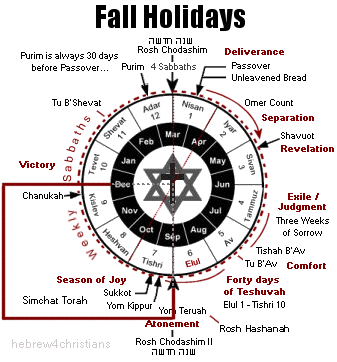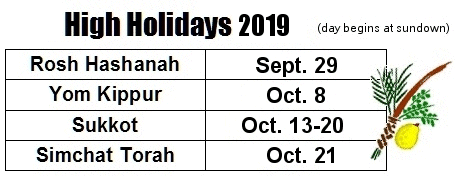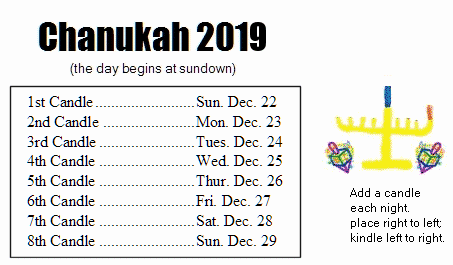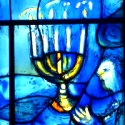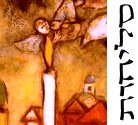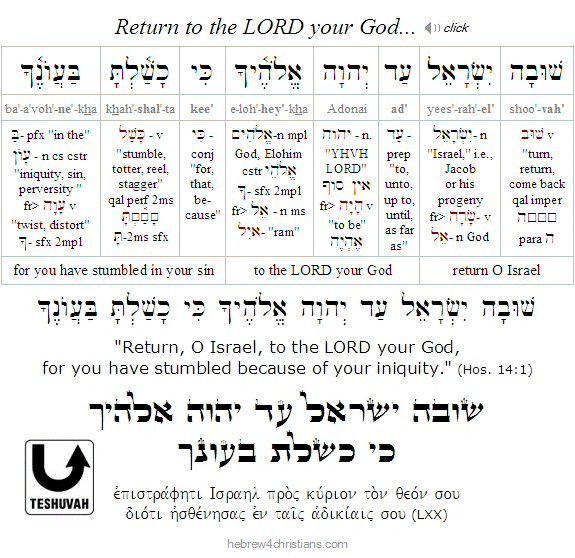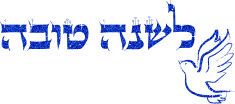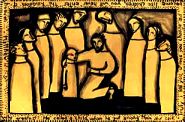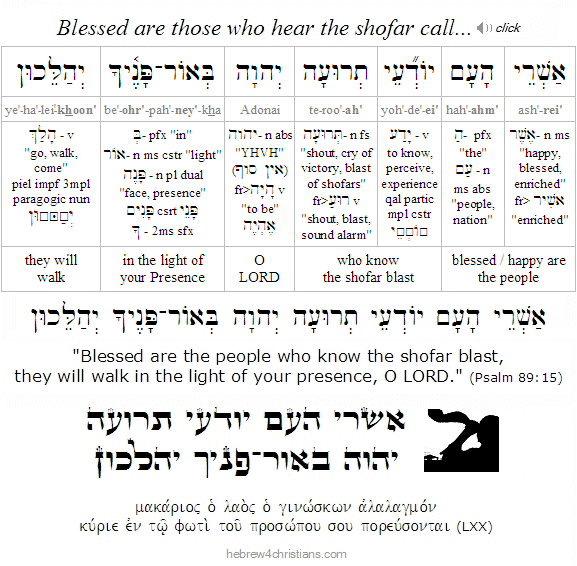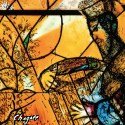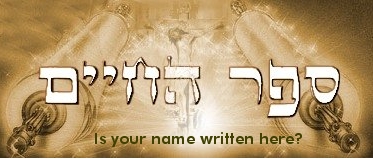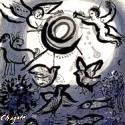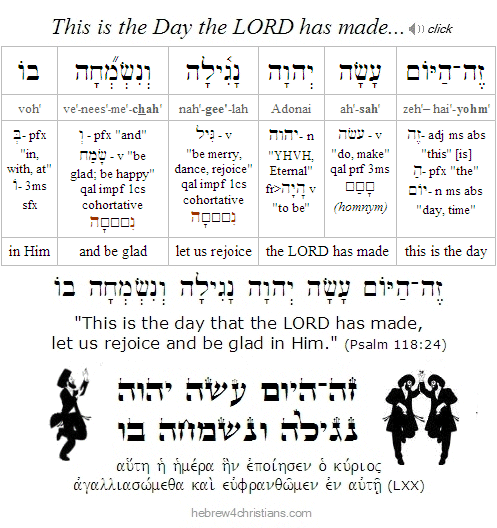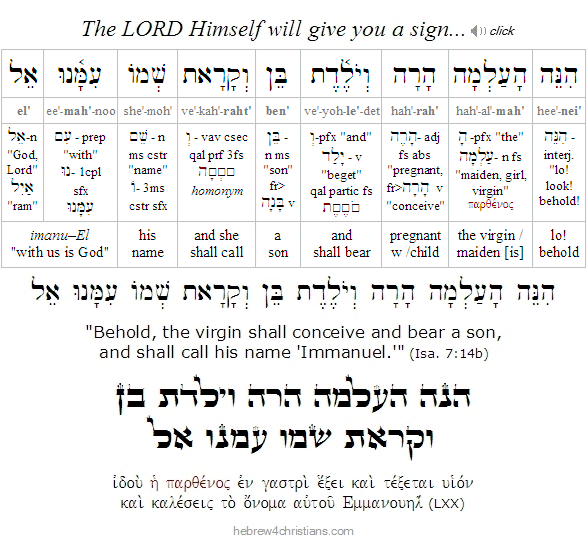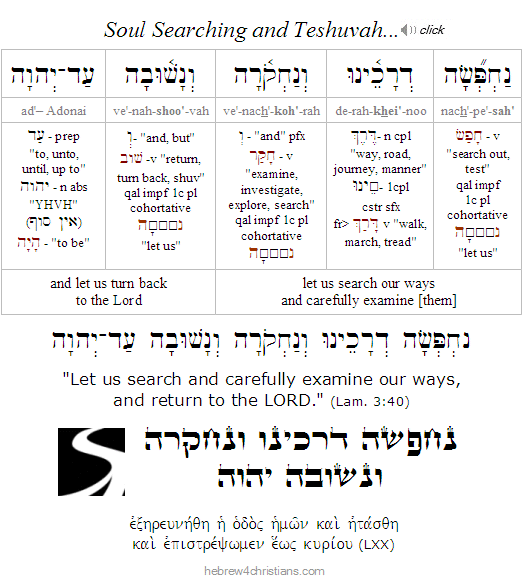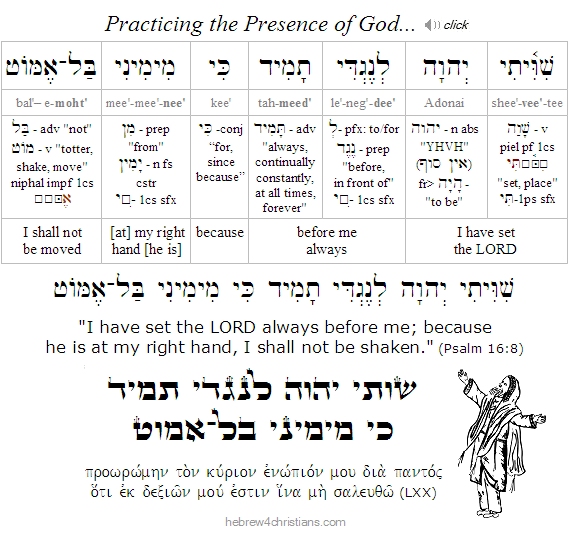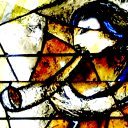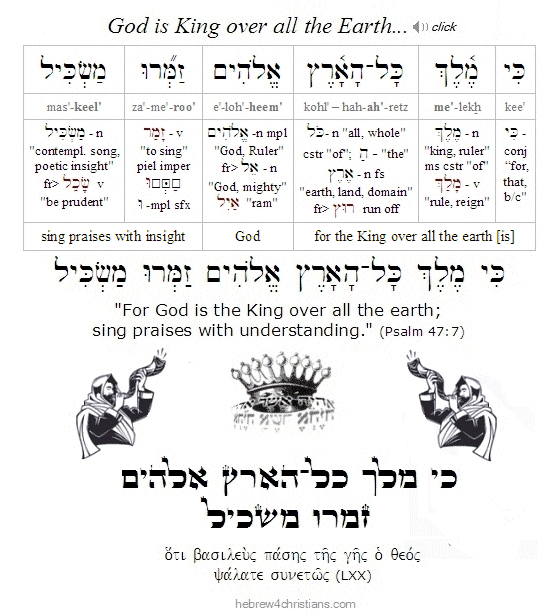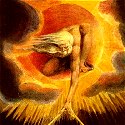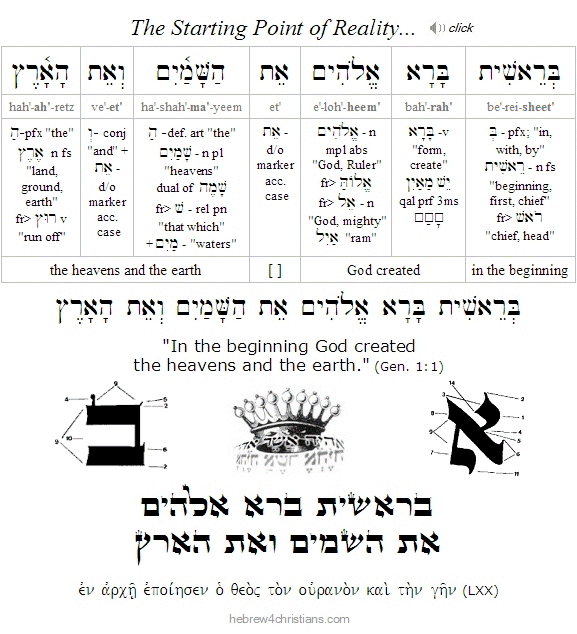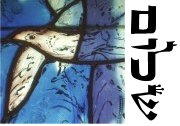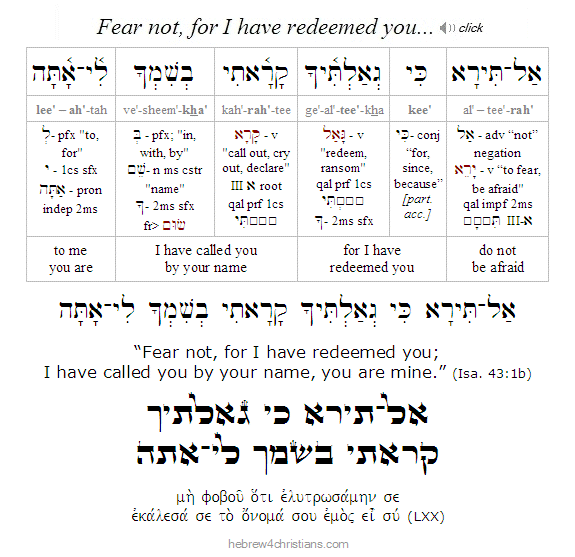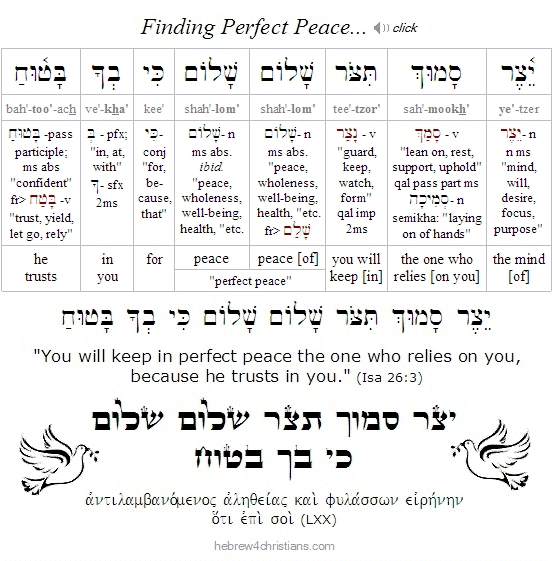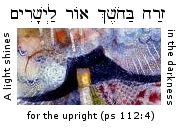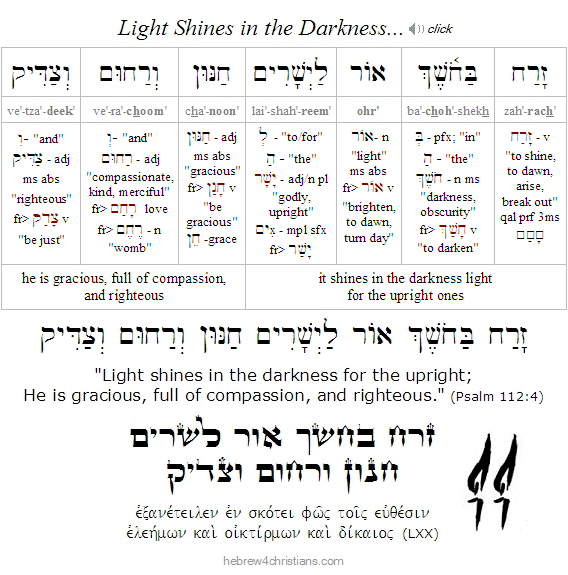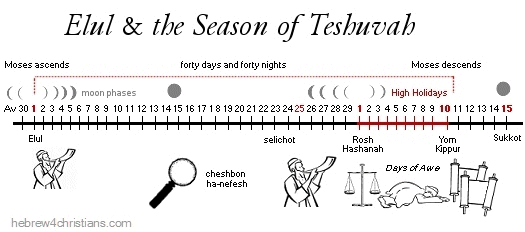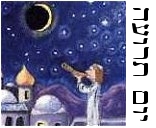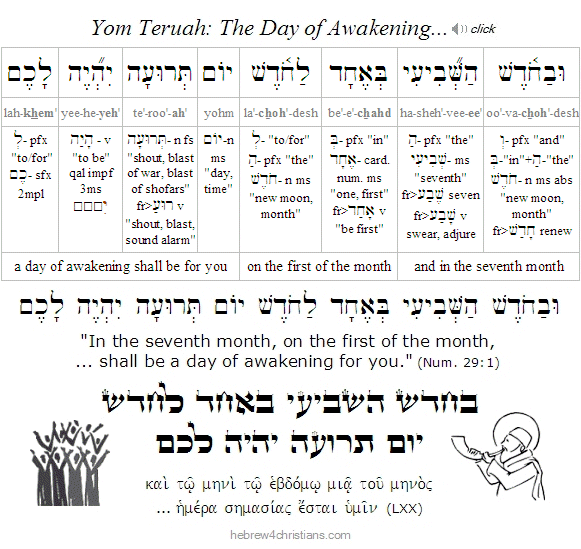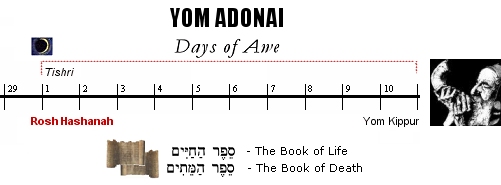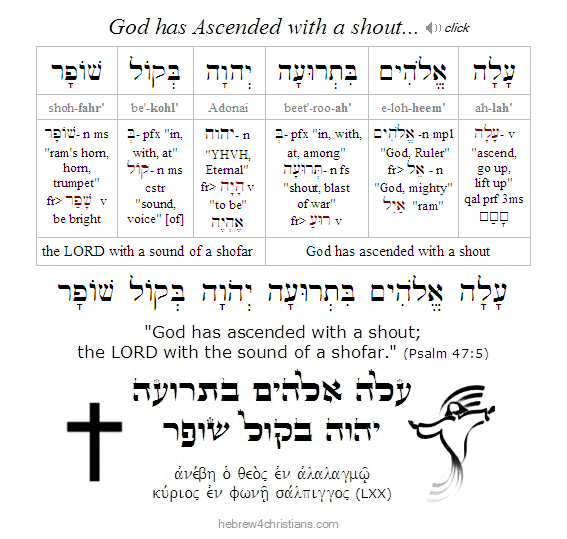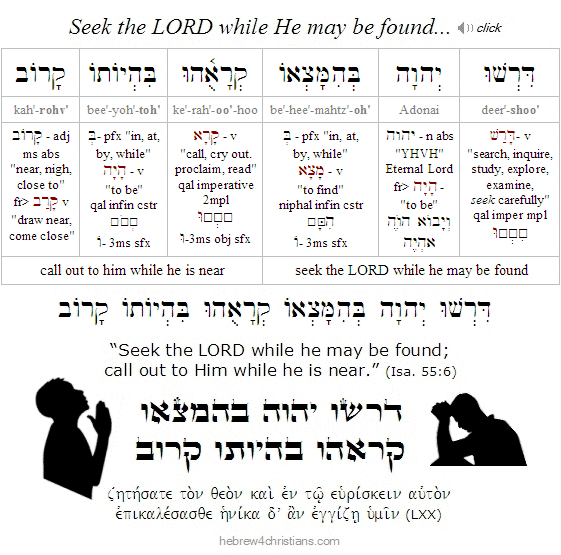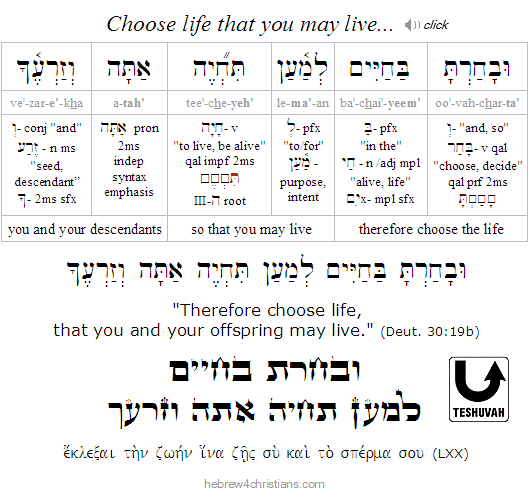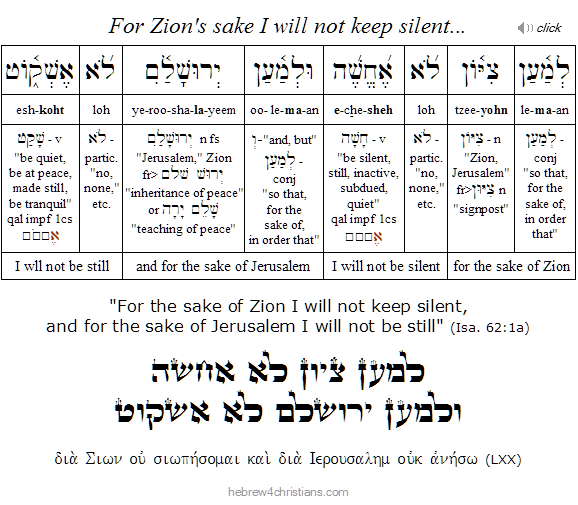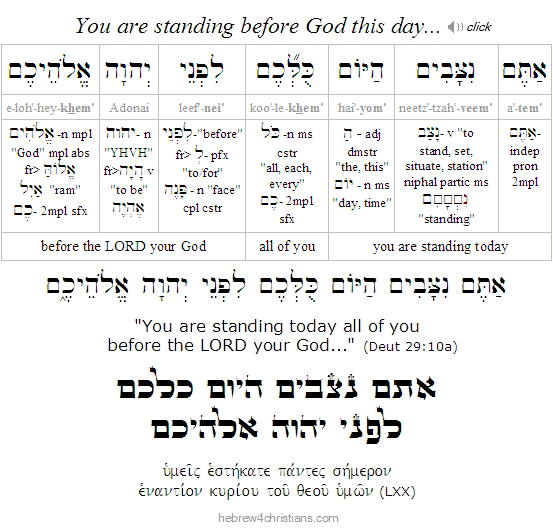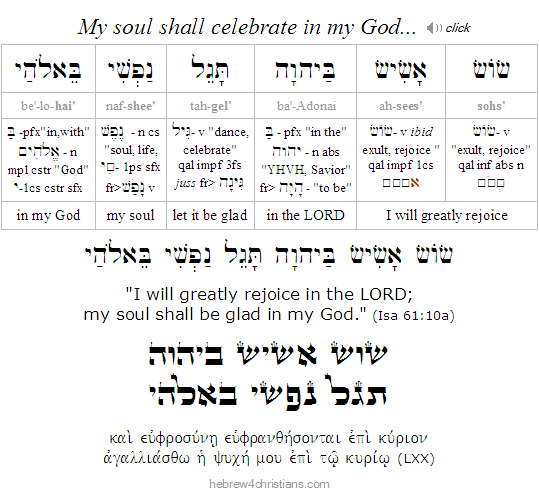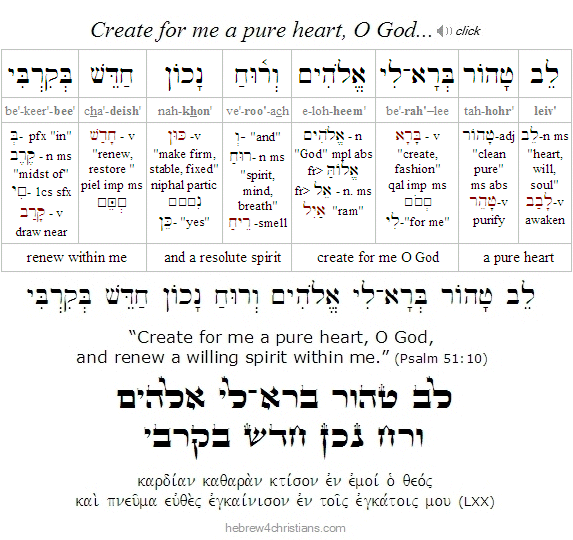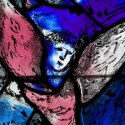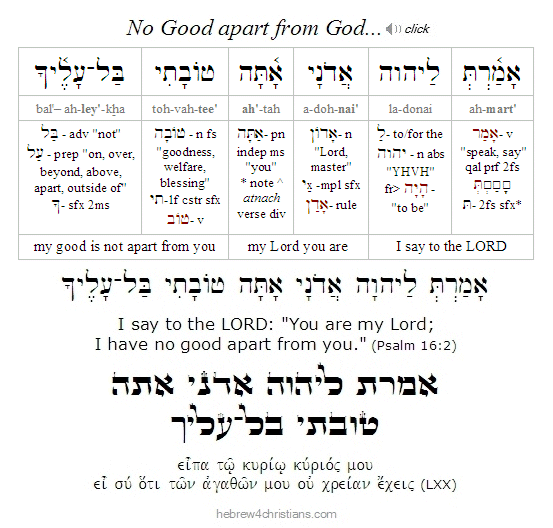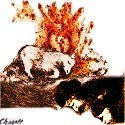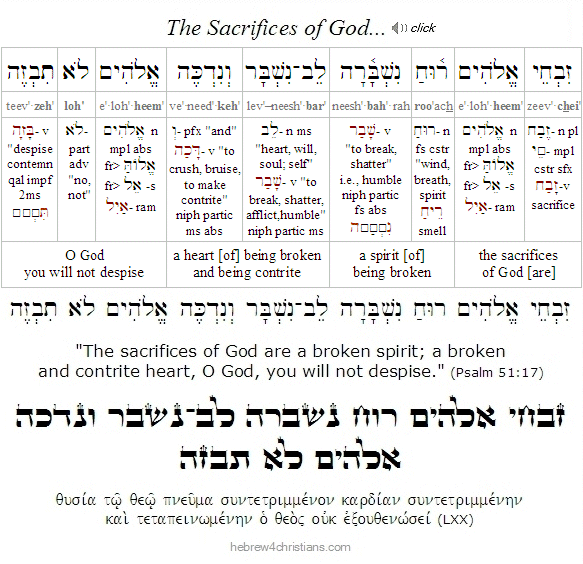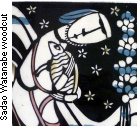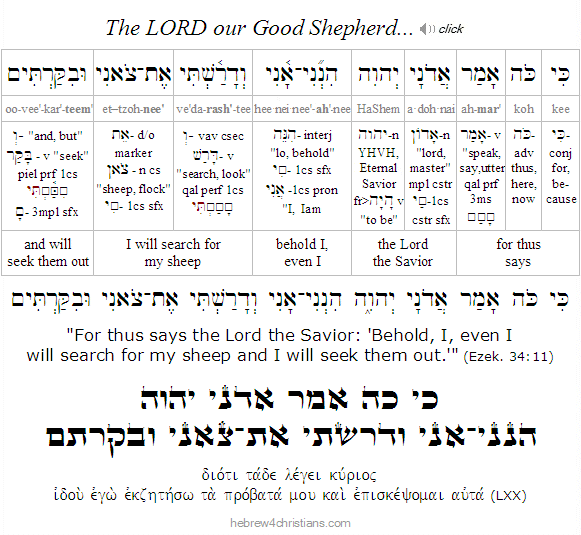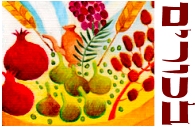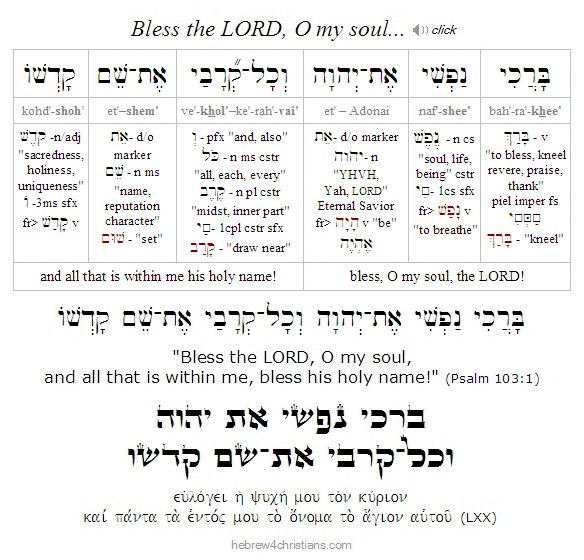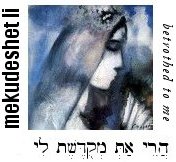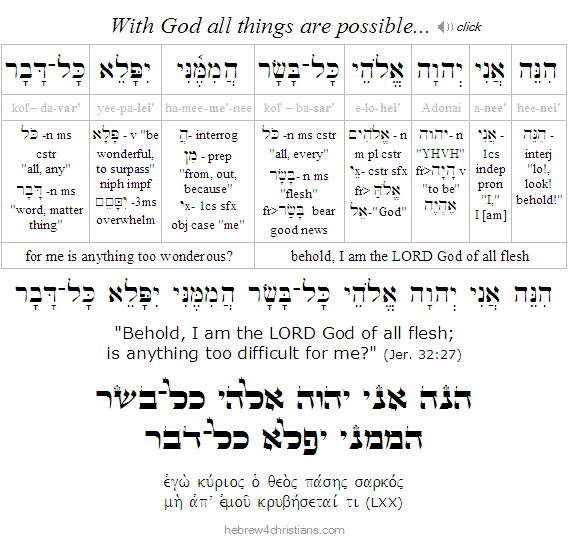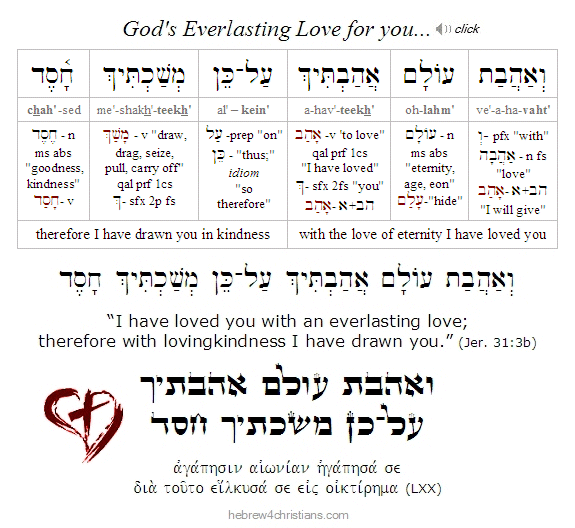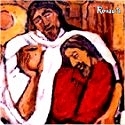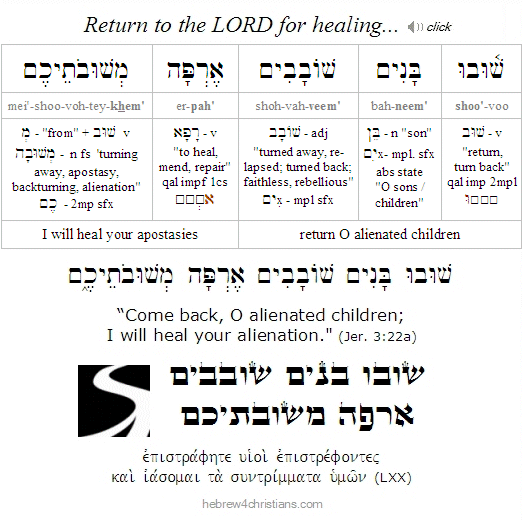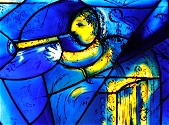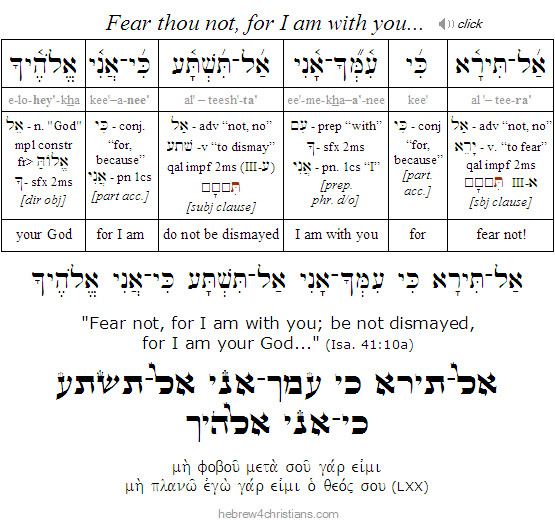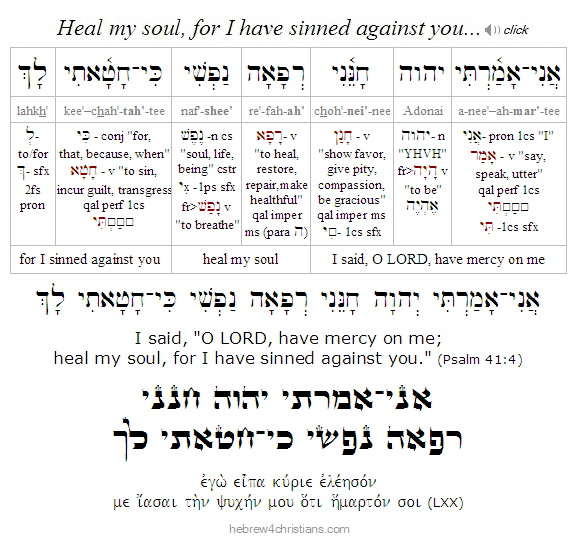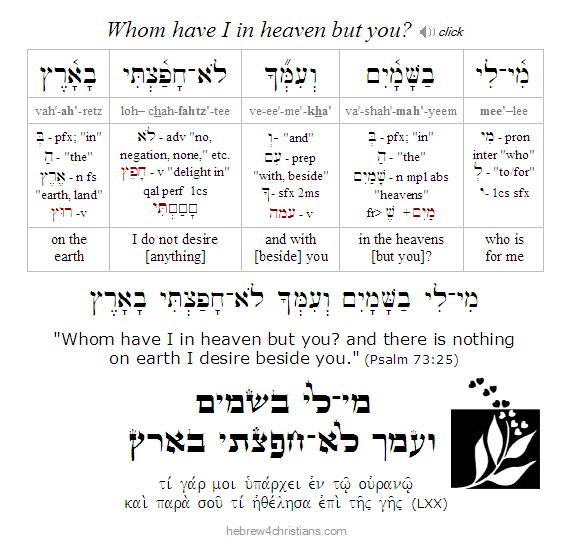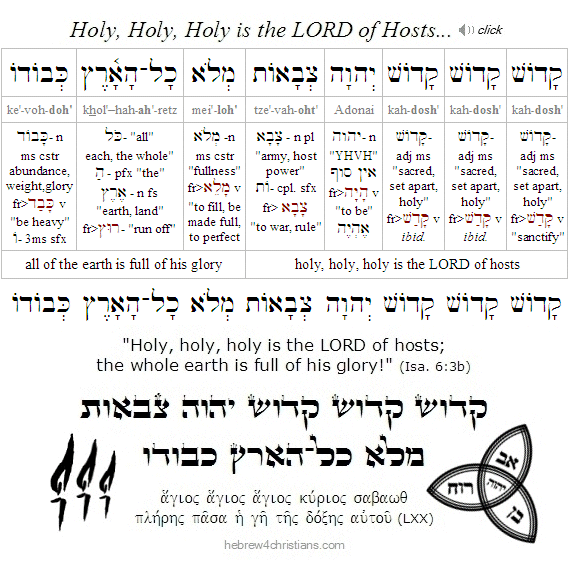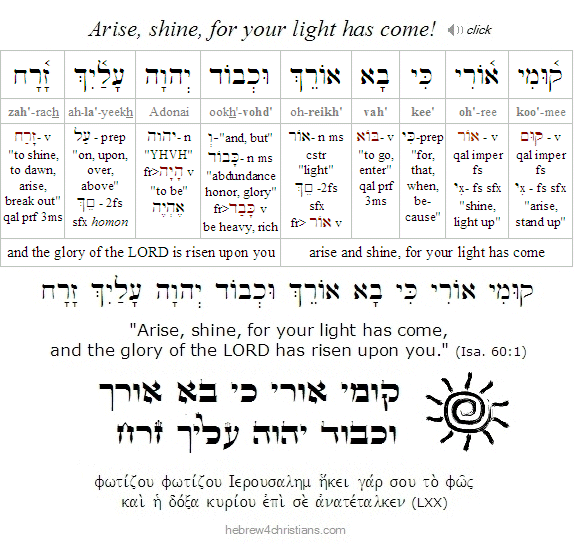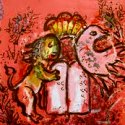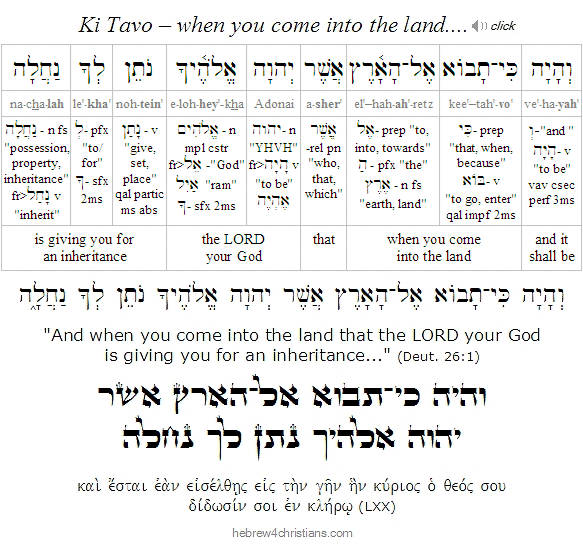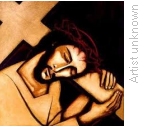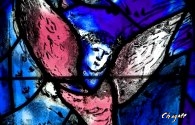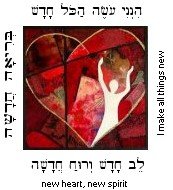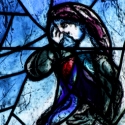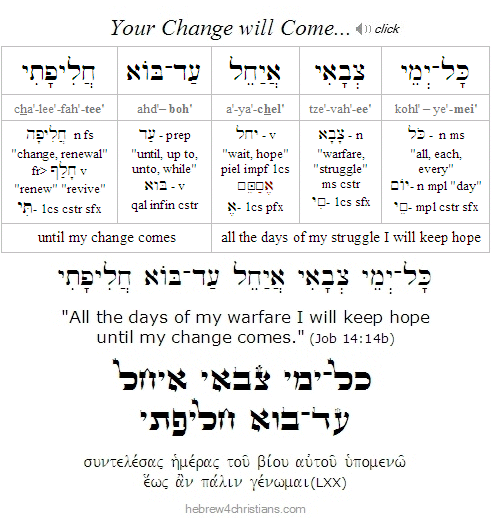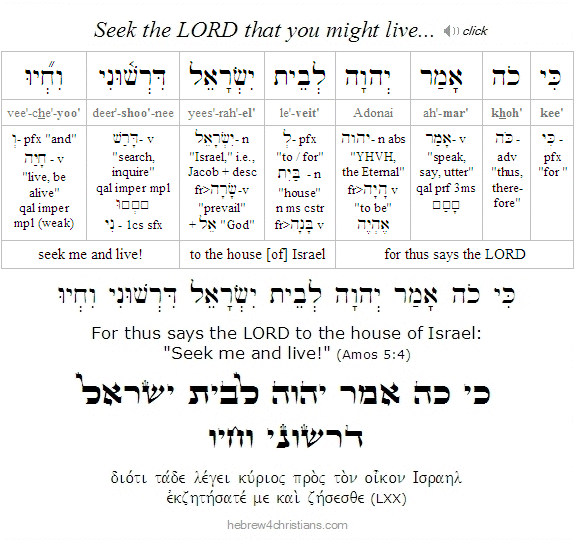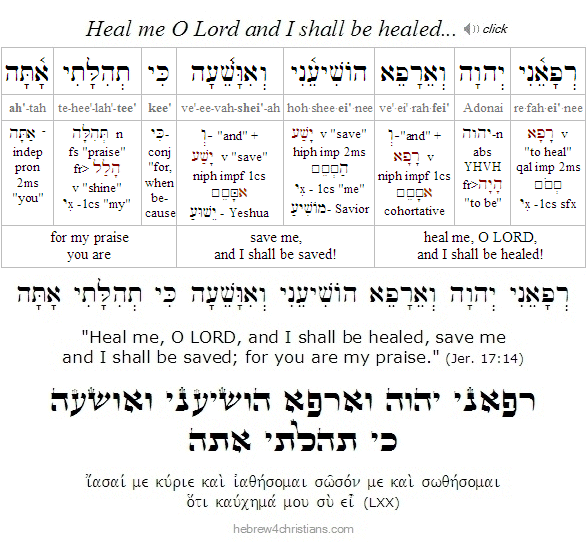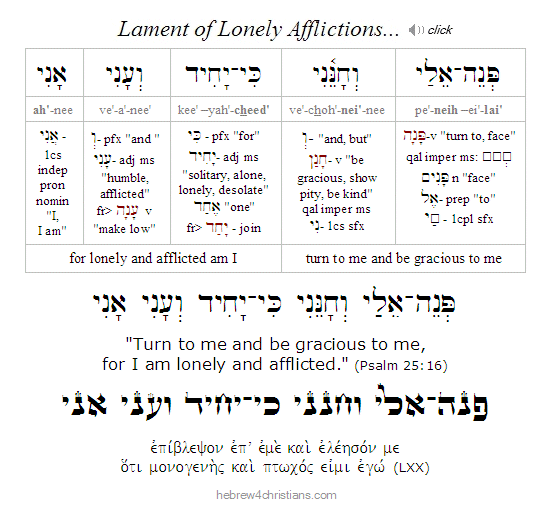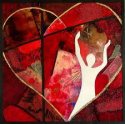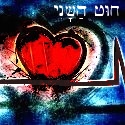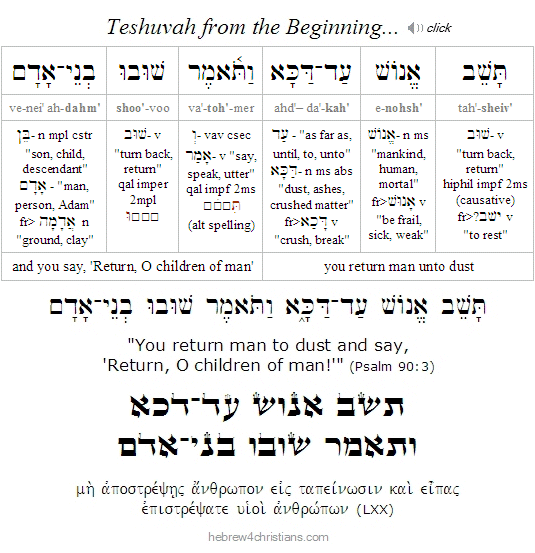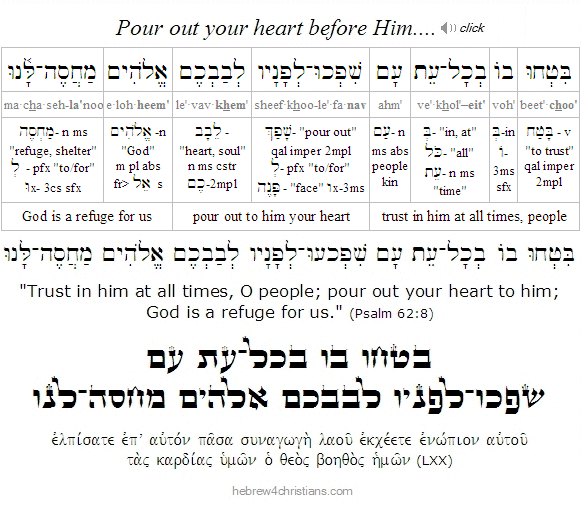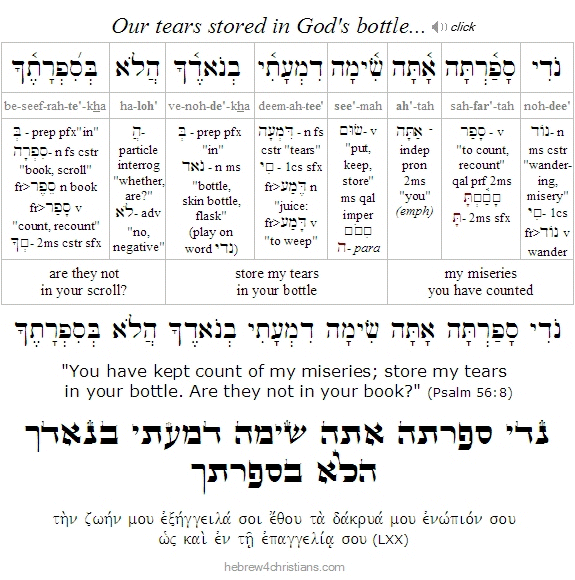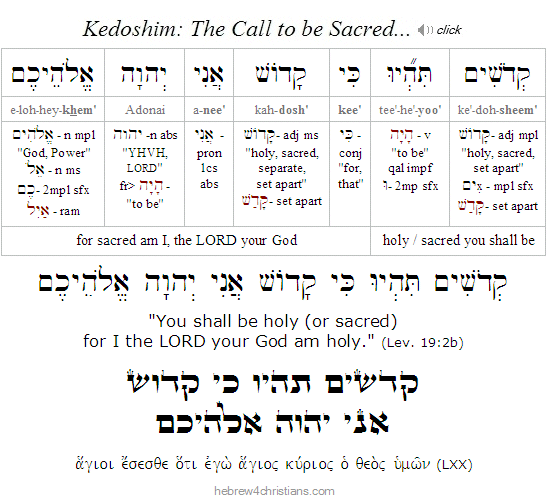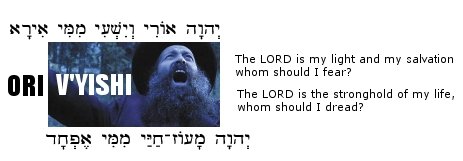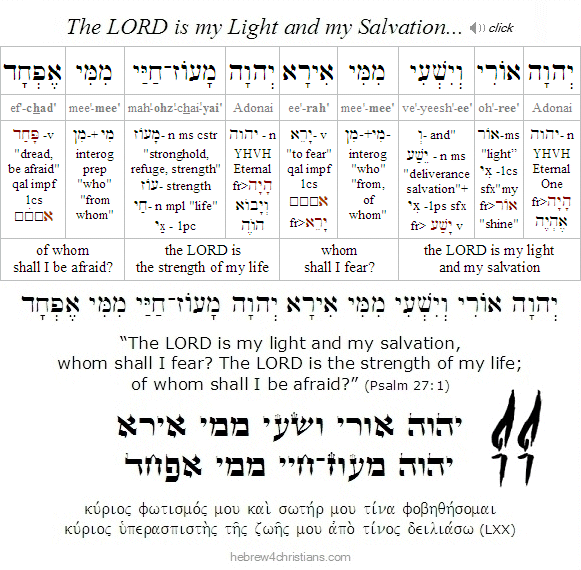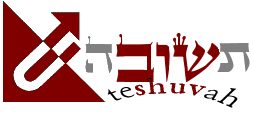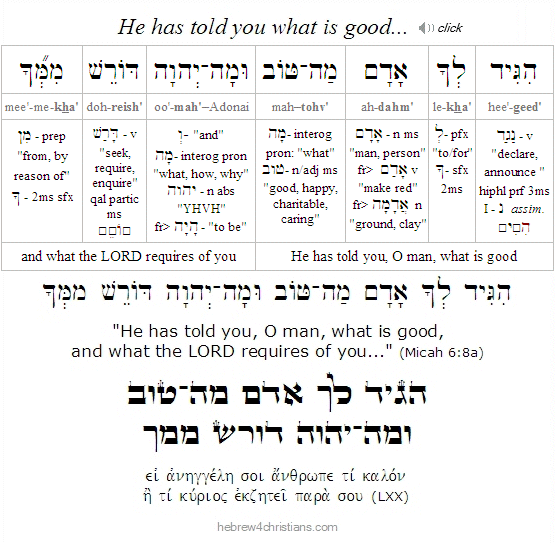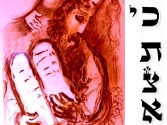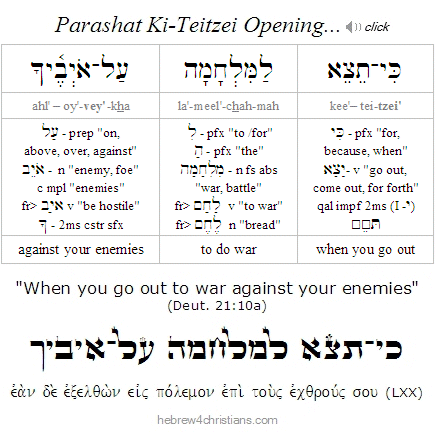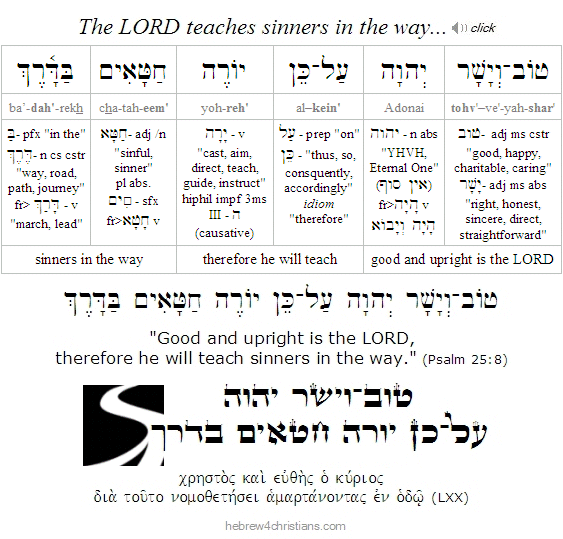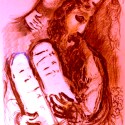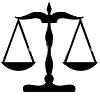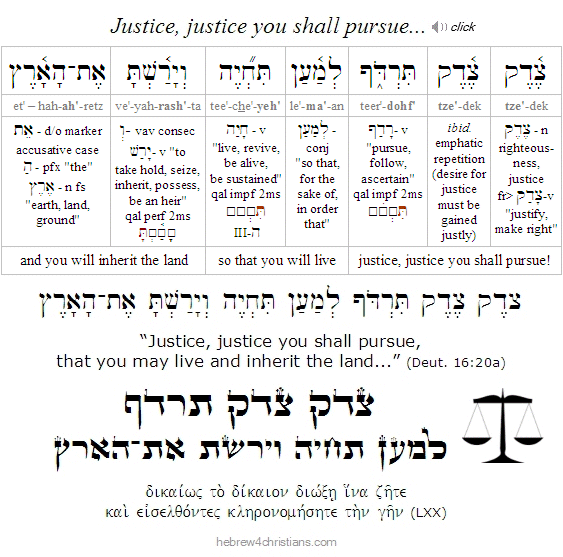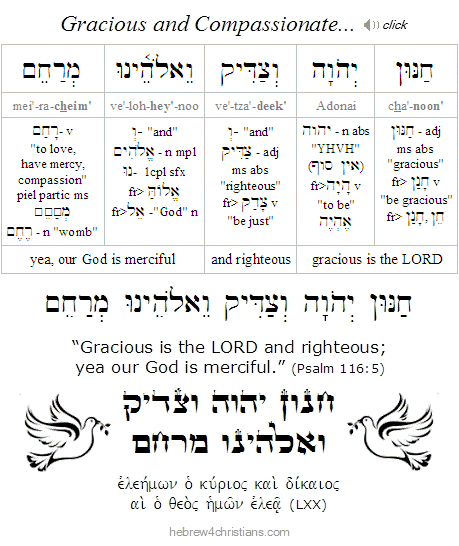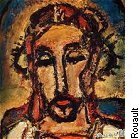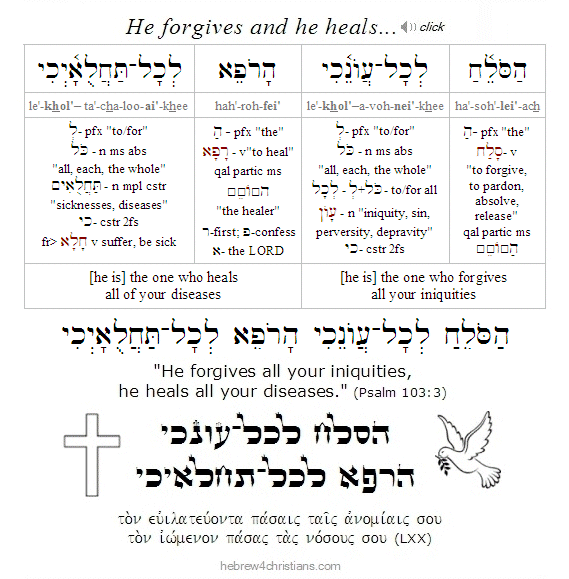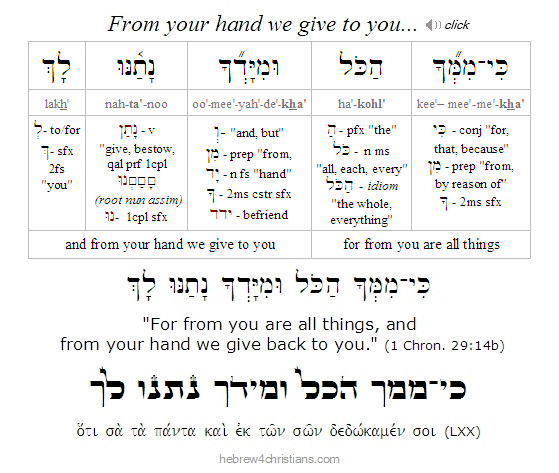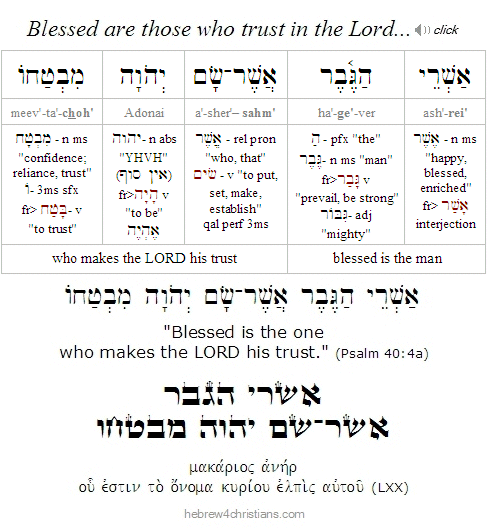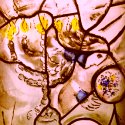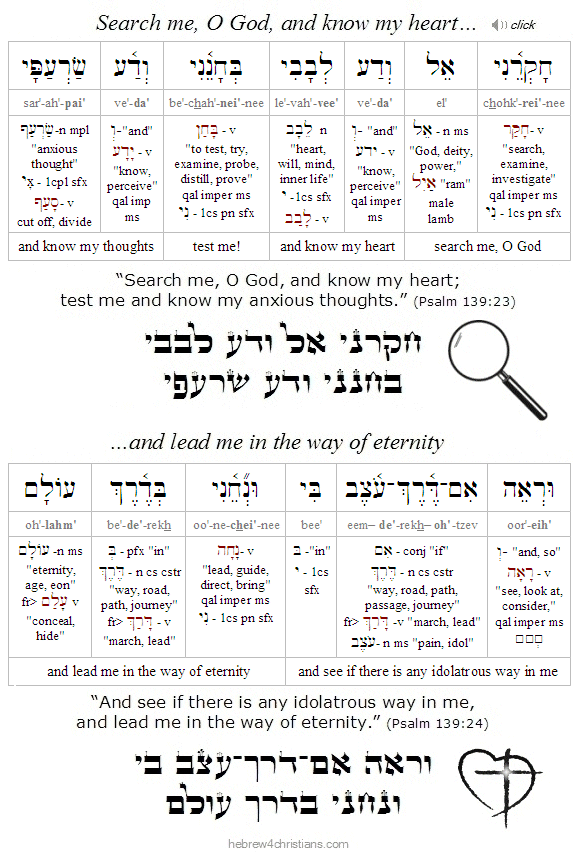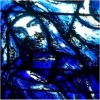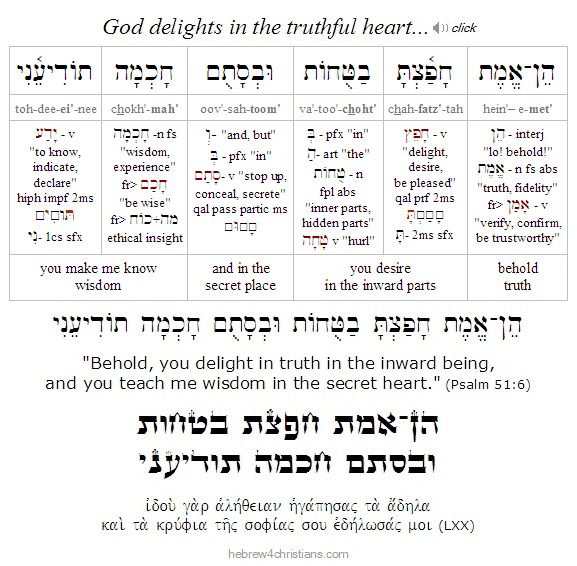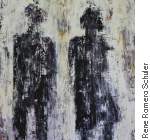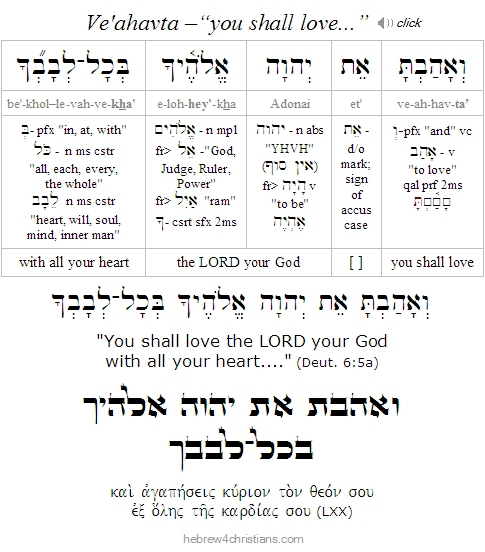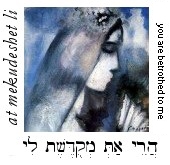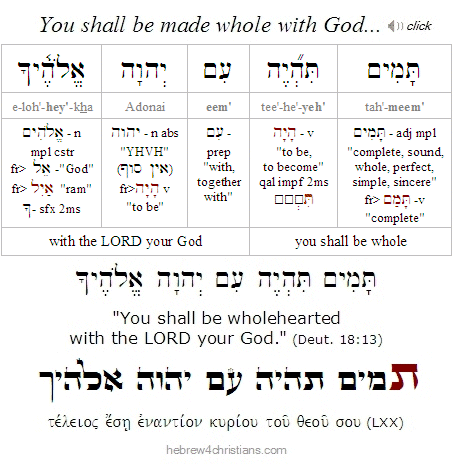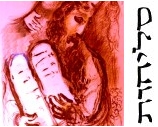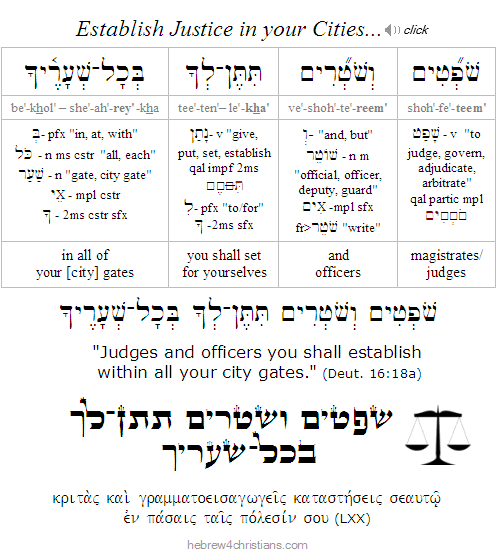|
|
|||||||||||||||||||||
 |
|||||||||||||||||||||
|
Learn Hebrew |
|||||||||||||||||||||
 |
|||||||||||||||||||||
|
Jewish Holiday Calendar For September 2019 site updates, please scroll past this entry....
The fall festivals prophetically indicate the Day of the LORD, the second coming of Yeshua, the great national turning of the Jewish people, and the establishment of the reign of the Messiah upon the earth during the Millennial Kingdom in the world to come.
1. Month of Elul (Fri. Aug. 30th [eve] - Sun. Sept. 29th [day]) 2. Month of Tishri (Sun. Sept. 29th [eve] - Mon. Oct. 28th [day]) - Fall holidays begin 3. Month of Cheshvan (Mon. Oct. 29th [eve] - Wed. Nov. 27th [day]) 4. Month of Kislev (Wed. Nov. 27th [eve] - Fri. Dec. 27th [day]) 5. Month of Tevet (Fri., Dec. 27th [eve] - Sun. Jan. 26th [day])
Note: For more about the dates of these holidays see the Calendar pages....
09.30.19 (Tishri 1, 5780) The Sabbath between Rosh Hashanah (i.e., Yom Teruah) and the solemn fast of Yom Kippur is the very first of the new year, called Shabbat Shuvah (שַׁבַּת שׁוּבָה) - that is, "the Sabbath of Return." It is called "shuvah" because the Haftarah (i.e., Hosea 14:1) begins, Shuvah Yisrael ad Adonai Elohekha (שׁוּבָה יִשְׂרָאֵל עַד יְהוָה אֱלהֶיךָ): "Return, O Israel, unto the LORD your God!" As the first Shabbat of the new year, Shabbat Shuvah is intended to "set the tone" for the rest of the year: שׁוּבָה יִשְׂרָאֵל עַד יְהוָה אֱלהֶיךָ shoo·vah · yees·rah·eil · ad · Adonai · e·loh·hey·kha "Return, O Israel, to the LORD your God, 09.30.19 (Tishri 1, 5780) Rosh Hashanah is called Yom Ha-Din (יוֹם הַדִּין), the Day of Judgment, whereas Yom Kippur is called Yom Ha-Rachamim (יוֹם הָרַחֲמִים), or the Day of Mercies, which suggests that God is first revealed as our Creator and Judge before He is known as our merciful Savior. This is hinted in the two accounts of creation, where God is first revealed as Elohim (Gen. 1:1), but later is revealed as YHVH (יהוה) when He breathed life into man nishmat chayim, the "breath of life" (Gen. 2:4). It is somewhat odd, however, that during Rosh Hashanah we do not approach God as our Judge, beating our breast in sorrow during confession of sin, as we do on Yom Kippur. Some say the reason we celebrate, eating special foods, rejoicing, listening to the shofar, is because we rejoice in the kingship of God as His royal children, and only later do we appeal to Him as merciful Judge in light of His revelation as YHVH, our Savior, Redeemer, and Lord. As believers in Yeshua, we have all the more reason to rejoice on Rosh Hashanah, since at the cross Yeshua took upon Himself our judgment to give us everlasting mercy from God.
[ Today we are observing the holiday of Rosh Hashanah (i.e., Yom Teruah) in anticipation of the High Holy Days of the Torah's calendar... ] 09.30.19 (Tishri 1, 5780) Though the term "Rosh Hashanah" does not occur in the Torah, the start of the 7th month (i.e., Tishri 1) is set apart by special shofar blowing (see Lev. 23:24-25, Num. 29:1-2). Furthermore, the Torah calls the end of the harvest year (in the fall) the "end of the year" (see Exod. 23:6), which indicates the symmetry of the calendar: the fall festivals "mirror" the spring festivals and correspond to one another. Just as there is a "new year" in the spring, on the new moon of Nisan, so there is in the fall, on the new moon of Tishri, the seventh month... That is why we make a "teruah" shout of thanks to God in anticipation of the fulfillment of God's redemptive purposes during the End of Days. [ Shanah Tovah dear friends! May the coming new year be one of blessing and growth for you as you persevere in your faith unto the revelation of the great day... ]
Indeed the word shofar (שׁוֹפָר) comes from a root (שָׁפַר) that means to "beautify," alluding to the beautification of our ways as we turn to God in teshuvah. "In this month (i.e., the seventh month of Tishrei) you shall amend (shapperu) your deeds. The Holy One, blessed be He, said to Israel: 'If you will amend (shippartem) your deeds I shall become unto you like a horn (shofar). As the horn takes in the breath at one end and sends out at the other, so will I rise from the Throne of Judgment and sit upon the Throne of Mercy and will impart for you the Attribute of Justice (Elohim) into the Attribute of Mercy (YHVH).' (Vayikra Rabbah: 29:6)
09.30.19 (Tishri 1, 5780) When King David repented from his sin and asked God's forgiveness, he appealed to the LORD: "Turn me to the joy of your salvation (יְשׁוּעָה) and give me with a willing spirit. Then I will teach transgressors your ways, and sinners will return to you" (Psalm 51:12-13). The sages comment that this is indeed the way of the LORD (דֶּרֶךְ יְהוָה), namely, to confess your sin, and in brokenness and heartfelt contrition, to return to the LORD full of hope in his steadfast love. In this way, sinners will understand the truth of Torah and return to the LORD God as well.... Hashiveinu, Adonai. 09.27.19 (Elul 27, 5779) The Scriptures teach that every word we speak and every choice we make are infallibly recorded in "heavenly scrolls," and one day these scrolls will be opened as a testimony about what we did with our lives (Dan. 7:10; Matt. 12:36-37; 1 Cor. 3:13, 4:5). "And I saw the dead, both the great and the small, standing before the throne, and books were opened. Then another book (סֵפֶר אַחֵר) was opened, which is called the Book of Life (סֵפֶר הַחַיִּים). And the dead were judged by what was written in the books, according to what they had done" (Rev. 20:12). 09.27.19 (Elul 27, 5779) God's Name is "I-AM-with-you-always," imanu-El (עִמָּנוּ אֵל) - always in the midst of you, your heart, your Center... The LORD is named this way because he is never without his own, and we are who we are in relation to his presence in our lives. Yeshua is not simply the Lord of the past or the Lord of the future, but the Lord of this moment, this "here" and this "now." He is the same yesterday, today, and forever - the breath of life, our sustaining hope, the Shepherd of our souls... Whatever else may come of this day, this is the day that the LORD has made, and we can find peace in God's Presence. זֶה־הַיּוֹם עָשָׂה יְהוָה zeh-hai·yom · a·sah · Adonai "This is the day that the LORD has made; Personal Note: We sincerely wish you "shanah tovah u'metukah ba'Adoneinu Yeshua ha-Mashiach" - a good and sweet year in our Lord Jesus the Messiah! May the LORD God heal you, body and soul; may He ease your pain, increase your strength, and release you from all your fears... May blessing, love, joy, and true shalom surround you and fill you with ongoing wonder and thanks. And above all, may you be inscribed and sealed in the Lamb's book of life (סֵפֶר הַחַיִּים אֲשֶׁר לַשֶּׂה) for good, friends! Shabbat Shalom and Amen.
09.27.19 (Elul 27, 5779) Many people minimize the idea of sin because they fail to recognize it as life-threatening, lethal, and spiritually disastrous. Sin (and its justification in our lives) cuts us off from God, however, and that invariably leads to a sense of existential dread (Isa. 59:2; Ezek. 18:4). "The wages of sin is death" (Rom. 6:23), and that means those who practice sin are considered "dead" even while alive (Berachot 18a-b). Tragically, sin can lead to the dreadful punishment of karet (כָּרֵת), being "cut off" from any awareness of the Truth. Regarding this the sages note that the Hebrew word for sin, chet (חַטְא), is written with a silent Aleph (א) because when we sin, the Master and LORD (אַלּוּף) is present, because without his power no one could lift his hand to do anything great or small. Here we note the terrible reality that our sin is witnessed by God himself, a pain that pierces his very heart. נַחְפְּשָׂה דְרָכֵינוּ וְנַחְקרָה nach·pe·sah de·rah·khei'·noo ve·nach·ko'·rah "Let us search and examine our ways In the time leading up to Rosh Hashanah (i.e., Teruah) and the High Holidays, we examine our lives and confess our sins (חֶשְׁבּוֹן הַנֶּפֶשׁ). Though God forgives us because of Yeshua's sacrifice, we nevertheless are called to turn away from sin and draw closer to the heart of the Father (1 John 1:9; James 4:8). "A person who claims to be connected with Him ought to live his life in the manner he did" (i.e., καθὼς ἐκεῖνος περιεπάτησεν καὶ αὐτὸς οὕτως περιπατεῖν: 1 John 2:6). Some people relegate the severity of sin to the idea of "judgment" taught in Torah. Understand that the cross *never* gives us license to sin but should awaken within us a desire to live in godly reverence by the power of God's Spirit... We are set free from sin by God's mercy, but again, that implies that we turn away from sin and live in the truth. "Freedom" does not mean the license to do whatever you want, but rather the power to do good. "Remember that the right direction leads not only to peace but to knowledge. When a man is getting better he understands more and more clearly the evil that is still left in him. When a man is getting worse he understands his own badness less and less. A moderately bad man knows he is not very good: a thoroughly bad man thinks he is all right. This is common sense, really. You understand sleep when you are awake, not while you are sleeping. You can see mistakes in arithmetic when your mind is working properly: while you are making them you cannot see them. You can understand the nature of drunkenness when you are sober, not when you are drunk. Good people know about both good and evil: bad people do not know about either." - C.S. Lewis
We usually serve matzah ball soup or tzimmes, fresh salad, and a main course such as pomegranate chicken over rice with some green beans. During the holiday meal we also eat some "ceremonial foods" (i.e., simanim) and recite Hebrew blessings over these "first tastes" of the new year... For example we will eat a few almonds, some beets, a bite of fish, a nosh of star fruit, and of course apple and honey (tapu'ach udvash) for dessert. Please understand that you don't "have" to do any of this (though it is a blessing if it's done in the right spirit). If you are new to all this or feeling anxious, my heartfelt advice is to follow the path of peace - our Lord doesn't lay heavy burdens on us but lightness and grace... Shalom. [ The following is related to the month of Elul and the theme of spiritual renewal... ]
[ The following is related to this week's Torah reading, parashat Nitzavim... ]
The language of the Torah here is emphatic: "even if your exile is at the farthest edge of heaven (בִּקְצֵה הַשָּׁמָיִם), from there the LORD your God will gather you..." (Deut. 30:4). Note that this prophecy is written in the singular and therefore pertains to each individual exile. God will "gather you," that is, he bring you back to make you whole. Even if your exile (singular) is to the uttermost, the LORD will take you and deliver you, as it is written, "He is able to save to the uttermost (σῴζειν εἰς τὸ παντελὲς) those who draw near to God through him, since he always lives to make intercession for them" (Heb. 7:25). Amen, chaverim... God will bring us home.
09.25.19 (Elul 25, 5779) Rosh Hashanah literally means the "head of the year," and it traditionally marks the anniversary of the creation of mankind. The sages note that where it is written, "When you take a census of the children of Israel" (Exod. 30:12), the Hebrew reads, "When you lift up the heads (כִּי תִשָּׂא אֶת־ראשׁ) of the children of Israel," which implies that each person should be encouraged to understand that they "count" in the eyes of Heaven. The sages also note that the word "Israel" (יִשְׂרָאֵל) contains the letters that form the phrase li rosh (לִי ראשׁ), "there is to me a head," that is, a soul created in the image of God.
[ Tonight at sundown marks Elul 25, the Day of Creation... ]
09.25.19 (Elul 25, 5779) Fear (and it's offspring, anger) create a sense of exile within the heart. This was true of the spies who refused to trust in God's promises but instead relied on human reason and all-too-human assumptions to consider the world. As we focus on the LORD and spiritual reality, however, we are delivered from fear, since God's light and love overcome all our darkness (John 1:5; 1 John 4:18; 5:3). The Spirit of God calls out: "Fear not, for I have redeemed you; I have called you by name, you are mine" (Isa. 43:1). God has personally redeemed you, friend; He calls you by name, and you belong to Him.
The Lord loves you with an "everlasting love" and draws you close (Jer. 31:3). He will never forsake you, even if you might face waters that seem to overwhelm or fires that seem to devour (Isa. 43:2). The LORD will keep you in "perfect peace" - the "peace of peace" (שָׁלוֹם שָׁלוֹם), when you set your mind on Him.
[ Our Torah portion this week, parashat Nitzavim, is always read on the last Shabbat of the year, since it describes the process of repentance (i.e., teshuvah)... ] זָרַח בַּחשֶׁךְ אוֹר לַיְשָׁרִים zah·rach · ba·choh·shekh · ohr · la·ye·shah·reem "Light dawns in the darkness for the upright;
09.24.19 (Elul 24, 5779) According to tradition, on Rosh Hashanah the destiny of the righteous, the tzaddikim, are written in the Book of Life (סֵפֶר הַחַיִּים), and the destiny of the wicked, the resha'im, are written in the Book of Death (סֶפֶר הַמָּוֵת). However, most people will not be inscribed in either book, but have ten days -- until Yom Kippur -- to repent before "sealing" their fate. On Yom Kippur, then, everyone's name will be sealed in one of the books. The ten days between Rosh Hashanah and Yom Kippur are therefore called Yamim Norai'm (יָמִים נוֹרָאִים), the "Days of Awe," as well as aseret yemei teshuvah (עֲשֶׂרֶת יְמֵי תְּשׁוּבָה) - the "Ten Days of Repentance" - because it is thought that personal repentance during this time will affect the divine decree for the coming year...
As Messianic believers, we maintain that Judgment Day (יום הדין) has come and justice was served through the sacrificial offering of Yeshua for our sins (2 Cor. 5:21). He is the perfect fulfillment of the Akedah of Isaac. Our names are written in the Lamb's Book of Life, or Sefer HaChayim (Rev. 13:8). We do not believe that we are made acceptable in God's sight by means of our own works of righteousness (Titus 3:5-6), but of course that does not excuse us from being without such works (as fruit of the Holy Spirit in our lives). The Scriptures clearly warn that on the Day of Judgment to come, anyone's name not found written in the Book of Life will be thrown into the lake of fire (Rev. 20:15). Moreover, professing Christians will stand before the Throne of Judgment to account for their lives (2 Cor. 5:10). "Every man's work shall be made manifest: for the day shall declare it, because it shall be revealed by fire; and the fire shall try every man's work of what sort it is" (1 Cor. 3:13). Life is an examination, a test, and every moment is irrepeatable. Every "careless" word we utter will be echoed on the Day of Judgment (Matt. 12:36-37). Our future day of judgment is being decided today.... לְשָׁנָה טוֹבָה תִּכָּתֵבוּ le·sha·nah toh·vah tee·ka·tei·voo May you be written (in the Book of Life) for a good year
09.24.19 (Elul 24, 5779) The Scriptures state that the first day of the seventh month is to be commemorated as "Yom Teruah" (יוֹם תְּרוּעָה), sometimes (mis)translated as the "Feast of Trumpets" (Num. 29:1, Lev. 23:24). The word teruah means "shouting" or "sounding an alarm," and therefore this day was to be marked by a sober "coming to attention" before the LORD. Of all the Biblical moedim (holidays), Yom Teruah is unique because 1) it's the only holiday that begins on a New Moon and 2) there is no explicit reason given in the Torah for its observance other than to "awaken" and to offer sacrifices (Num. 29:1, Lev. 23:24).
After the Second Temple was destroyed in 70 AD, however, the sages of the Mishnah associated Yom Teruah with the end of the harvest and the beginning of the Jewish civil year, and the holiday then became known as "Rosh Hashanah" (the head of the year). The holiday marked the beginning of an intensive ten-day period of prayer, self-examination and repentance (aseret yemei teshuvah), which culminated on the solemn fast day of Yom Kippur (Day of Atonement). These ten days are referred to as Yamim Norai'm (יָמִים נוֹרָאִים), the "Days of Awe," or the "High Holy Days." Rosh Hashanah also commemorates the creation of the universe (בְּרִיאַת הָעוֹלָם) by God and focuses on our responsibilty to give account of our lives before the Judge over all...
[ The following is related to the month of Elul and the "Season of Repentance"... ] כִּי הַמִּצְוָה הַזּאת אֲשֶׁר אָנכִי מְצַוְּךָ הַיּוֹם kee · ha·meetz·vah · ha·zoht · a·sher · ah·noh·khee · me·tza·ve·kha · hai·yohm "For this commandment that I command you today
09.23.19 (Elul 23, 5779) The "Shavuah Tov" audio broadcast for this week provides both an overview of the weekly Torah reading (i.e., Nitzavim), but also discusses the fall holidays of the Torah's calendar, and particularly the significance of Rosh Hashanah (i.e., Yom Teruah) for followers of Yeshua the Messiah. I hope you might find it helpful, chaverim. Links are below:
[ The holiday of Rosh Hashanah begins Sunday September 29th at sundown... ]
For more on this subject, see Should Christians Celebrate Rosh Hashanah?
09.23.19 (Elul 23, 5779) "Seek the LORD while he may be found, call upon him while he is near: Let the wicked forsake his way, and the unrighteous man his thoughts: and let him return unto the LORD, and he will have mercy upon him; and to our God, for he will abundantly pardon" (Isa. 55:6-7). But how will we seek if we do not believe? And how will God be found unless God makes it possible for us to find Him? Hashivenu. We first believe the invitation to return is for us, and the moment we believe we draw near, which is to say God reveals himself to the heart of faith. If you feel devoid of God's presence, heed David's words to "set the LORD" before you (Psalm 16:8). Ask God for help to truly know Him and have confidence that he will indeed heal you. No prayer offered according to his heart will ever go unanswered (1 John 5:14-15). "The greatest honor we can give to the Almighty is to live gladly because of the knowledge of his love" (Julian Norwich). As Yeshua promised: "Whoever has my commandments and keeps them, he it is who loves me. And he who loves me will be loved by my Father, and I will love him and manifest myself to him" (John 14:21). Note that the Greek word translated "manifest" means to "shine inside" (i.e., ἐμφανίζω, from ἐν, "in" and φαίνω, "shine"), indicating that the revelation would be inward light of the Presence of Messiah himself (Χριστὸς ἐν ὑμῖν, ἡ ἐλπὶς τῆς δόξης, Col. 1:27). God calls you so that you might find him to be the greatest love of your life, and as you receive that love, as you embrace it as your own, the love of Messiah will become inwardly visible to you. This comes from a place of surrender and acceptance. As Paul Tillich said, "Sometimes in a moment of weakness light breaks into darkness, and it is as though a voice says, 'You are accepted; you are accepted... Do not seek for anything; do not perform anything; do not intend anything. Simply accept the fact that you are accepted.' If that happens to you, then you experience grace, and everything will be transformed." Ultimately teshuvah is about salvation and transformation - beauty from ashes - and the love of God... דִּרְשׁוּ יְהוָה בְּהִמָּצְאו deer·shoo · Adonai · be·hee·mahtz·oh "Seek the LORD while he may be found; How many are the days of your life? How many opportunities for you to make up your mind? "How long will you go limping between two opinions?" Therefore choose this day whom you will serve. Salvation is as close as your own mouth and heart (Deut. 30:11-14; cp. Rom. 10:8-13). Make the first step; open your heart, and the LORD will then help you make the wholehearted decision to "seek the LORD while He may be found; call upon Him while He is near." Amen.
[ Yom Teruah (i.e., "Rosh Hashanah") begins this coming Sunday Sept. 29th at sundown... ] Moses then went on to review Israel's history and prophetic future -- i.e., the great prophecy of the Diaspora and the eventual return of the people -- and then solemnly appealed for the people to turn to the LORD for life: הַעִידתִי בָכֶם הַיּוֹם אֶת־הַשָּׁמַיִם וְאֶת־הָאָרֶץ ha·ee·doh·tee vah·khem hai·yohm et ha·shah·ma·yeem ve·et hah·ah·retz "I call heaven and earth to witness against you today, But why this seemingly topsy-turvy process of teshuvah? Why do the Jewish people have to go through this long period of suffering, tribulation, and scattering, only to be finally regathered one day in the future? Moses himself gives us the answer (as does the Apostle Paul in the Book of Romans): "The secret things (ha-nistarot) belong to the LORD our God (הַנִּסְתָּרת לַיהוָה אֱלהֵינוּ), but the things that are revealed (ha-niglot) belong to us and to our children forever, that we may do all the words of this law" (Deut. 29:29). Part of the "secret things" concerns the mystery the suffering of the Jewish people, since it is clear that God particularly afflicts those whom he loves through testing, and indeed part of the meaning of being am segulah (a "select people") implies dealing with God - by means of blessing or by curse (Heb. 10:31). In the end, however, God's plan for Israel will decisively demonstrate His wisdom, power, and glory, so much so that that Paul commented on ethnic Israel's future by exclaiming, "Oh, the depth of the riches and wisdom and knowledge of God! How unsearchable are his judgments and how inscrutable his ways" (Rom. 11:33).
[ Yom Teruah (i.e., "Rosh Hashanah") begins this coming Sunday Sept. 29th at sundown... ]
Rosh Hashanah has long been associated with the Day of Judgment (יום הדין) in Jewish tradition. According to many of the sages, the time immediately preceding the appearance of the Messiah will be a time of testing (nisayon) in which the world will undergo various forms of tribulation called chevlei Mashiach (חֶבְלֵי הַמָּשִׁיחַ) - the "birth pangs of the Messiah" (Sanhedrin 98a; Ketubot, Bereshit Rabbah 42:4, Matt. 24:8). Some say the birth pangs are to last for 70 years, with the last 7 years being the most intense period of tribulation -- called the "Time of Jacob's Trouble" / עֵת־צָרָה הִיא לְיַעֲקב (Jer. 30:7). The climax of the Great Tribulation is called the great "Day of the LORD" (יוֹם־יהוה הַגָּדוֹל) which represents God's wrath poured out upon a rebellious world system. On this fateful day, the LORD will terribly shake the entire earth (Isa. 2:19) and worldwide catastrophes will occur. "For the great day of their wrath has come, and who can stand?" (Rev. 6:17). The prophet Malachi likewise says: "Surely the day is coming; it will burn like a furnace. All the arrogant and every evildoer will be stubble, and that day that is coming will set them on fire,' says the LORD Almighty. 'Not a root or a branch will be left to them'" (Mal. 4:1). Only after the nations of the world have been judged will the kingdom of God (מַלְכוּת הָאֱלהִים) be established upon the earth. The remnant of Israel will be saved and the 1,000 year reign of King Messiah will then commence (Rev. 20:4). For more information, see "As the Day Draws Near." "I will greatly rejoice in the LORD; I will be overjoyed because of my God. For he clothes me in garments of deliverance; he puts on me a robe symbolizing vindication. I look like a bridegroom when he wears a turban as a priest would; I look like a bride when she puts on her jewelry. For just as the ground produces its crops and a garden yields its produce, so the sovereign LORD will cause deliverance to grow, and give his people reason to praise him in the sight of all the nations. (Isa. 61:10-11) The great Day of the LORD and time of judgment on the nations draws near, and Zion's deliverance is fully assured. All of the covenant promises of God given to Israel will be fulfilled. God will finish the work of redemption promised to the Jewish people. שׂוֹשׂ אָשִׂישׂ בַּיהוָה תָּגֵל נַפְשִׁי בֵּאלהַי sohs · ah-sees · ba'adonai "I will greatly rejoice in the LORD;
09.20.19 (Elul 20, 5779) Some people think of "purity of heart" in moral terms, such as not looking with lust on others, not coveting, etc., though these are symptoms of disordered love... Genuine purity is a matter of focus, making a decision to believe the miracle in order to find the "good portion" and the "one thing necessary" (Luke 10:42). We "believe to see" (Psalm 27:13). Purity of heart therefore realizes that all that you've ever longed for is found in God alone. "There is but one good; that is God. Everything else is good when it looks to Him and bad when it turns from Him" (C.S. Lewis). It is a great, great gift from heaven to know God as your heart's true desire - to fully understand that your relationship with Him is the ultimate concern and treasure of your existence.
[ The following entry concerns this week's Torah reading, parashat Ki Tavo.... ]
09.20.19 (Elul 20, 5779) We are responsible to walk in truth and to reject what is false (1 John 4:6). This implies that we have a moral and spiritual duty to think clearly and not to abuse our minds (Phil. 4:8; Rom. 12:2). The LORD our God will help us to do this, as Yeshua said: "I will ask the Father, and he will give you a Helper (παράκλητος, someone "called to one's side"), to be with you forever, even the Spirit of Truth (רוּחַ הָאֱמֶת), whom the world cannot receive, because it neither sees him nor knows him" (John 14:16-17). The Spirit of Truth helps us "discern what is the will of God, what is good, acceptable, and perfect" (Rom. 12:2) and empowers us to take "every thought captive" to the reality of the Divine Presence (2 Cor. 10:4-5). Truth is connected to memory - both in our personal histories as well as the history of God's redemptive actions performed on our behalf. Truth is ἀλήθεια, "a-letheia," not forgetfulfulness... Hence we are constantly commanded to remember what God has done for us and to "diligently repeat" the truth to our children (Deut. 6:4-9). Similarly, the Spirit of Truth brings to remembrance the words of Yeshua to our hearts (John 14:26). "The greatest hazard of all, losing one's self, can occur very quietly in the world, as if it were nothing at all. No other loss can occur so quietly; any other loss - an arm, a leg, five dollars, a wife, etc. - is sure to be noticed." - Kierkegaard Genuine teshuvah (repentance) implies that we will change our thinking in order to be transformed by God's truth (the word used in the Greek New Testament is metanoia (μετάνοια, from μετά, "beyond" + νοῦς, "mind"), suggesting going beyond the "natural" and "carnal" cateogories of expectation in order to apprehend divine reality). The follower of Messiah "cannot do anything against the truth, but only for the truth" (2 Cor. 13:8). During this Season of Teshuvah, may God help us all to think clearly and to turn our thoughts to Him. May He protect us from the vanity of a darkened mind and from all distractions that attempt to seduce us away from Him. May the LORD give us the purity of heart to know and do His will in the truth. Amen.
09.20.19 (Elul 20, 5779) Do you have the "gift of holy desperation"? That's the special blessing of needing God so viscerally that you will fall apart or even self-destruct apart from His daily intervention in your life... "Find God or die." You pray because your very life depends on it; you believe because without God, you would be swallowed up in darkness. "Blessed are the poor in spirit," Yeshua said, "for theirs is the kingdom of heaven" (Matt. 5:3). Note that the term translated "the poor" (οἱ πτωχοι) is derived from a word that means "to crouch as a helpless beggar." This word provides an image of someone in abject poverty, totally dependent on others for help. The "poor in spirit" are those who are painfully aware of their exile and need for help from God: "Give me yourself, O my God, give yourself back to me. Lo, I love you, but if my love is too mean, let me love more passionately. I cannot gauge my love, nor know how far it fails, how much more love I need for my life to set its course straight into your arms, never swerving until hidden in the covert of your face. This alone I know, that without you all to me is misery, woe outside myself and woe within, and all wealth but penury, if it is not my God... O Lord my God, tell me what you are to me. Say to my soul, I am your salvation. Say it so that I can hear it. My heart is listening, Lord; open the ears of my heart and say to my soul, I am your salvation. Let me run toward this voice and seize hold of you. Do not hide your face from me: let me die so that I may see it, for not to see it would be death to me indeed." - Augustine of Hippo The fire on the altar was to be kept burning at all times (Lev. 6:12-13) symbolizing the "inner fire of the heart." How blessed it is to be full of the fire of this inner need, this relentless groaning, this constant hunger and thirst for God and his righteousness! Even more wonderful is how the korban tamid - the daily whole burnt sacrifice of the lamb - represents Yeshua's ongoing and wholehearted passion for you to come alive to God's love... How blessed we are to receive the bread of life from the hand of our heavenly Father.
Spirituality often enough involves a sense of irremediable brokenness, a feeling that you are not whole, that you are a mess, and that your need for God's healing is constant and relentless... Contrary to the ideals of proud humanism, spirituality is a state of "blessed neediness," of being "afflicted in spirit," a desperate ache for God's power of healing. Those who humbly cry out to the LORD understand their great need for deliverance, "Woe is me, for I am ruined..." (Isa. 6:5). As Yeshua said, "Everyone who exalts himself will be humbled, but the one who humbles himself will be exalted" (Luke 18:14). In a beautiful sense the human heart will gradually (the grace of God is never taken by force) become more and more discontented -- that is, it will desire more and more ardently, will long more and more intensely, to be assured of grace. See, now everything has become new, everything has changed. With respect to the earthly, one needs little, and to the degree one needs less, the more perfect one is. A pagan who knew how to speak only of the earthly has said that the deity is blessed because he needs nothing, and next to him the wise man, because he needs little. In a human being's relationship with God, it is inverted: the more he needs God, the more deeply he comprehends that he is in need of God, and then the more he in his need presses forward to God, the more perfect he is. Therefore, the words "to be contented with the grace of God" will not only comfort a person, and then comfort him again every time earthly want and distress make him, to speak mundanely, needful of comfort, but when he really has become attentive to the words they will call him aside, where he no longer hears the secular mentality's earthly mother tongue, the speech of human beings, the noise of shop keepers, but where the words explain themselves to him, confide to him the secret of perfection: that to need God is nothing to be ashamed of but is perfection itself, and that the saddest thing of all is if a human being goes through life without discovering that he needs God. (Soren Kierkegaard: Upbuilding Discourses)
[ The following entry concerns this week's Torah reading, parashat Ki Tavo... ]
09.19.19 (Elul 19, 5779) "What do you think? If a man has a hundred sheep, and one of them has gone astray, does he not leave the ninety-nine on the mountains and go in search of the one that went astray? And if he finds it, truly, I say to you, he rejoices over it more than over the ninety-nine that never went astray" (Matt. 18:12-13). Though it involves sorrow, and the pain of being lost, repentance is ultimately about finding joy, and when we return to God, we have reason to rejoice. The Good Shepherd says, "Rejoice with me, for I have found my sheep that was lost. Just so, I tell you, there will be more joy in heaven over one sinner who repents than over ninety-nine righteous persons who need no repentance" (Luke 15:6-7). The Son of Man came to seek and to save the lost: "For thus says the Lord GOD: Behold, I myself will search for my sheep and I will seek them out... I myself will be the Shepherd of my sheep, and I myself will make them lie down, declares the Lord GOD. I will seek the lost, and I will bring back the banished, and I will bind up the injured, and I will strengthen the sick..." (Ezek. 34:11,15-16).
Note how this passage from Ezekiel again shows that Yeshua is none other than YHVH, our Good Shepherd who came to seek and to save the lost. His is the Name above all other names!
[ The following entry concerns this week's Torah reading, parashat Ki Tavo.... ] בָּרֲכִי נַפְשִׁי אֶת־יְהוָה ba·ra·khee · naf·shee · et · Adonai "Bless the LORD, O my soul, The bikkurim ritual testifies that God has redeemed us so that we will produce fruit in our lives to His glory (John 15:7-8).
09.18.19 (Elul 18, 5779) If you ever feel frustrated because of recurring personal struggles and failures, do not add to your troubles by despising yourself, but instead allow your character defects to lead you to humility and surrender before God. Bear in mind that you are unable to please God apart from his intervention and help (John 6:63), so avoid self-reproach, since teshuvah is not about learning to deal with your pains, after all, but trusting the Lord to do the miracle of healing within you. You "have been crucified with the Messiah" (Gal. 2:20) - the verb used in this phrase is a "perfect passive" form (i.e., συνεσταύρωμα), meaning that it indicates completed action done on your behalf. Your job is not to devise your own sanctification but to receive the blessing by faith, trusting in God's righteousness given on your behalf. The focus is not on you, and when you get out of the way and surrender, the grace and love of God will do the impossible within you (Matt. 19:26). In a way, teshuvah is a form of death, that is, identifying with the judgment of Messiah given on your behalf, just as teshuvah is life as you take hold of your new identity in him. Practically speaking you turn away (i.e., "die to") your anger, disappointments, bitterness, and sorrows by turning to the Lord for his acceptance and grace. God will bring freedom and newness of life from what binds your heart. As C.S. Lewis once advised: "Remember that He is the artist and you are only the picture. You can't see it. So quietly submit to being painted, that is, keep fulfilling all the obvious duties of your station... asking forgiveness for each failure and then leaving it alone. You are in the right way. Walk --- don't keep on looking at it" (Collected Letters). How you do teshuvah depends a great deal on where you are standing: if you are before the cross of Messiah, then you stand on the side of divine grace; otherwise you will remain in a place of exile, questioning God's love for you.
The message of the gospel (i.e., הבשורה, from the word basar) requires that you regard yourself as worth dying for, that you are God's friend... "There is no greater love than this: that someone lay down his life for his friends" (John 15:13). God quite literally demands that you regard yourself as worth the sacrifice of his beloved son Yeshua in your place; he demands that you understand how dear you are to his heart. God sees something of such great value in you that he was willing to suffer and die to redeem it from loss... Just as the kingdom of God is a "pearl of great price," so you are a pearl of great price to God. What grieves and angers God is the refusal to believe that you are someone of infinite importance to him... Only God can rightfully make such a demand because He knows that loving other things more than Him leads to "disordered love," darkness, and eventual madness. We were made for God's love, but substituting finite things for this infinite need will never suffice to bring lasting healing to our souls... True repentance has a distinct and constant reference to the Lord Jesus Christ. If you repent of sin without looking to Christ, away with your repentance! If you are so lamenting your sin as to forget the Savior, you have need to begin all this work over again. Whenever we repent of sin we must have one eye upon sin and another upon the Cross. Or, better still, let us have both eyes upon Christ, seeing our sin punished in Him and by no means let us look at sin except as we look at Jesus.
וְאַהֲבַת עוֹלָם אֲהַבְתִּיךְ ve·a·ha·vat oh·lahm a·hav·teekh "I have loved you with an everlasting love; Genuine repentance will entirely change you. It is an act of profound respect over what God has done on your behalf. You say, but I am a miserable wretch! Indeed that is so, but the consciousness of your wretched state is the heart's cry for love... God goes "outside the camp" to meet with you. He enters the leper colony to join you there, in your wretchedness, and even takes upon your fatal disease. He sees you in your desperate estate and joins you there. God enters into the dust of your death and says, "Live!"
[ The following is related to the month of Elul and the theme of teshuvah (repentance)... ]
09.17.19 (Elul 17, 5779) As human beings, we experience everything in terms of spatio-temporal relationships. We can't help it. Whatever you experience is "framed" within boundaries of space and time. Language itself is embedded into this framework, since it is rhythmic (time-based) and intentional (space-based); that is, it attempts to correlate a sequence of human sounds with events in the world (the grandiose attempt to "transcend" these limitations has been the dream of metaphysical philosophers for ages, but the task is ultimately self-stultifying and idolatrous). "Perhaps ... experience merely defines, so to speak, the shape of that gap where our love of God ought to be. It is not enough. It is something. If we cannot "practice the presence of God", it is something to practice the absence of God, to become increasingly aware of our unawareness till we feel like men who should stand beside a great cataract and hear no noise, or like a man in a story who looks in a mirror and finds no face there; or a man in a dream who stretches out his hand to visible objects and gets no sensation of touch. To know that one is dreaming is to be no longer perfectly asleep." (C.S. Lewis: Four Loves) If we are suddenly shocked from our "everydayness" we invariably will ask the question about the meaning or purpose of life. Is everything random, purposeless, pointless, and ultimately vacuous, or is there some goal or point to all the motion of the universe? How can I find a sense of belonging, a sense of place, that will be unshakable and abiding? "Am I afraid to die? I am every time I let myself be seduced by the noisy voices of my world telling me that my 'little life' is all I have and advising me to cling to it with all my might. But when I let these voices move to the background of my life and listen to that small soft voice voice calling me Beloved, I know that there nothing to fear, and that dying ... leads me into the eternal embrace of my God whose love is everlasting." (Henri Nouwen: Life of the Beloved). "Fear thou not, for I am with thee." Surely the LORD God of Israel is the same yesterday, today, and forever (Heb 13:8). Despite your present state of exile, God will neither leave you nor forsake you (Heb. 13:5, John 14:18). Trust now that He will strengthen and help you with "the right hand of His righteousness."
[ We always read Psalm 27 throughout the month of Elul to prepare for the fall holidays.... ] אַחַת שָׁאַלְתִּי מֵאֵת־יְהוָה אוֹתָהּ אֲבַקֵּשׁ a·chat · shah·al·tee · mei·eit-Adonai · oh·tah · a·va·keish "One thing have I asked of the LORD, that I seek:
If we consciously delight ourselves in the Lord, He has promised to give us the desires of our heart (Psalm 37:4). As Yeshua taught us: "seek first the Kingdom of God" (Matt. 6:33). "In the eleventh hour one understands life quite differently than in the days of youth or in adulthood's busy time or in the final moment of old age. The person who repents at any other hour of the day repents only temporarily; he fortifies himself with a false and superficial notion of the insignificance of guilt; he fortifies himself with a deceptive and busy notion of the length of life - that person's regret is not true inwardness. O eleventh hour, how changed everything is when you are present; how still everything is, as if it were the midnight hour; how earnest everything is, as if it were the hour of death; how solitary, as if it were among the tombstones; how solemn, as if it were in eternity!" - Soren Kierkegaard: Upbuilding Discourses
09.16.19 (Elul 16, 5779) "Be merciful to me, O Lord, a sinner..." (Luke 18:13). Here there is no litany of sins recited; no lengthy confession, no inventory of misdeeds enumerated, but rather a wholesale confrontation with the reality of the heart's sin-sick condition. It's not this or that sin that sends us into exile but a heart unwilling to confront God's mercy. We aren't sinners because we sin; we sin because we are sinners, and therefore the issue of God's mercy is total and severe. Our essential problem is spiritual death, being "stillborn in the natural," and therefore we need the miracle of a new life. Focusing on our sinful deeds misses the point of our heart's need for radical mercy, and as long as we are missing that we are running away from the truth of our underlying sin, which is the denial of our lost condition and our need for love. We must begin there, with the confession of our inner poverty, to find healing and grace to seriously attend to matters of our misdeeds and sins before heaven. אֲנִי־אָמַרְתִּי יְהוָה חָנֵּנִי a-nee · ah-mar-tee · Adonai · choh-nei-nee I said, "O LORD, be gracious to me;
[ The following is related to the month of Elul and the theme of teshuvah (repentance)... ]
09.16.19 (Elul 16, 5779) From our Torah this week (i.e., Ki Tavo) God says to his people: "You are a treasured possession (i.e., am segulah: עַם סְגֻלָּה) ... a people holy to the LORD your God " (Deut. 26:18-19). Holiness, or kedushah (קְדוּשָׁה), represents transformation, being wholly set apart and turned toward the sacred, the Divine Presence. As the LORD said to Moses from the midst of the shining flame: "Take off your sandals from your feet, for the place on which you stand is holy" (Exod. 3:5). The Chofetz Chaim comments: "By faith see that this place, right now, is holy ground, and awaits your response." Amen, and may we open our eyes to God's light: קָדוֹשׁ קָדוֹשׁ קָדוֹשׁ יהוה צְבָאוֹת ka·dohsh ka·dohsh ka·dohsh Adonai tze·va·oht "Holy, holy, holy is the LORD of hosts; Spiritually speaking, the very first step is to find hope... The Divine Light, created before the physical light of this world (Gen. 1:3), is seen by means of the eye of faith (עַיִן שֶׁל אֱמוּנָה), as it is written, "Light dawns in the darkness for the upright; He is gracious, merciful, and righteous" (Psalm 112:4). Therefore we find life by trusting in God's Presence, even as we learn to see the invisible (2 Cor. 4:18; 5:7). "Trust in the LORD with all your heart, and do not lean on your own understanding. Know Him in all your ways, and He will straighten your paths. Be not wise in your own eyes; fear the LORD, and turn away from evil" (Prov. 3:5-7).
[ The following entry concerns this week's Torah reading, parashat Ki Tavo... ] "Arise and shine (קוּמִי אוֹרִי) for your light has come, and the glory of the LORD (כְּבוֹד יהוה) has risen upon you. For behold, darkness shall cover the earth, and thick darkness the peoples; but the LORD will shine upon you (וְעָלַיִךְ יִזְרַח יהוה), and his glory will be seen upon you (וּכְבוֹדוֹ עָלַיִךְ יֵרָאֶה). And nations shall come to your light, and kings to the brightness of your rising. Lift up your eyes all around, and see; they all gather together, they come to you; your sons shall come from afar, and your daughters shall be carried on the hip" (Isa. 60:1-4). Sometime during the "plague of darkness" that represents the time of the Great Tribulation (i.e., the Day of the LORD and the judgment of the world, or Yom Adonai), Israel will finally turn to the LORD and receive Yeshua as their long-lost Messiah (Zech. 12:10). The veil will finally be taken away, and all Israel will be saved. The Light of Salvation (Yeshua) will be revealed and the glory of the LORD (כְּבוֹד יהוה) will radiantly shine (זָרָח) upon the Jewish people. The land of Israel will be like Goshen during the times of the plagues of Egypt as the world powers are all judged and destroyed. Then the survivors of the nations will understand that the LORD is indeed with Israel and will turn to Him in surrender as well. "And the glory of the LORD shall be revealed, and all flesh shall see it together, for the mouth of the LORD has spoken" (Isa. 40:5). Yeshua will return to Zion to establish the Kingdom of God upon the earth (Zech. 2:10-13). קוּמִי אוֹרִי כִּי בָא אוֹרֵךְ koo·mee oh·ree kee vah ohr·reikh "Arise, shine, for your light has come, The LORD said to Moses from the midst of the shining flame: 'Take off your sandals from your feet, for the place on which you stand is holy' (Exod. 3:5). The Chofetz Chaim comments: We all need to rise higher... Never say, I will be able to lift myself up at another time or different place. By faith see that this place, right now, is holy ground, and awaits your response. May God open the "eyes of your heart" to help you see (Eph. 1:18-19). 09.15.19 (Elul 15, 5779) Shavuah tov, chaverim! Our Torah portion this week (parashat Ki Tavo) includes instructions for the people to ratify the Sinai covenant in the promised land by means of a special ceremony performed in the valley between Mount Ebal and Mount Gerazim (later fulfilled by Israel, see Josh. 8:30-35). During this ceremony the blessings for obedience and the curses for disobedience would be declared, and Moses warned the people by providing a seemingly endless description of terrible consequences that would befall the Jewish people if they disobeyed the terms of the Sinai covenant (Deut. 28:15-68). In Jewish tradition this litany of woe is called the "tochachah" (תּוֹכָחָה), a word that means "rebuke" or "reprimand." Reading the tochachah is difficult and painful, though it serves as a bitter medicine to wake us up and prevent us from falling into a lethal coma. In that sense the tochechah may be regarded as a great blessing, since it shocks us into experiencing the gravity of God's grace. This is similar to Yeshua's grave warnings about the dangers of hell. If we refuse to listen or rush past his words, we are missing the substance of God's lament given through the Hebrew prophets. Sin is a lethal problem, and we must turn to God for healing or we will die. As Blaise Pascal once wrote, "Between heaven and hell is only this life, which is the most fragile thing in the world." Therefore shuvah! -- turn to God and receive the blessing of life!
09.15.19 (Elul 15, 5779) The Torah clearly teaches there is no remission of sin without the shedding of blood (Lev. 17:11, Heb. 9:22). The sacrificial death of Yeshua as the great "Lamb of God" was intended not only to cleanse us from sin (and to absolve us from the verdict of guilt as required by the law), but was also intended to fully satisfy both God's justice and and compassion (see Rom. 3:22-25; Psalm 85:10). In other words the cross is the place (ha'makom) where Yeshua "became sin for us" - the One who knew no sin - that we might be made the righteousness of God (2 Cor. 5:21). As the apostle Paul wrote: "The Messiah redeemed us from the curse of the law by becoming a curse for us -- for it is written, 'A Man hanged on a tree is cursed of God...' (Gal. 6:13, quoting Deut. 21:22-23). The Son of Man was "lifted up" to save from death as the brazen serpent (נְחַשׁ נְחֹשֶׁת) in the desert prefigured (Num. 21:9; John 3:14-15). And just before Yeshua died upon the cross, he said something of tremendous significance. Eyewitnesses to his crucifixion wrote, "When he had received the drink (of vinegar) Yeshua said, 'It is finished.' With that, he bowed his head and gave up his spirit" (John 19:30; Matt. 27:50). In Koine Greek, this final statement is recorded as a single word: tetelestai (Τετέλεσται), a cheer of victory and triumph. In Hebrew, Yeshua might have uttered, "nishlam" (נִשְׁלָם) or perhaps more likely "gemar tov" (גְמָר טוּב), testifying to his fully accomplished atonement (כַּפָּרָה) made on our behalf....
09.13.19 (Elul 13, 5779) Teshuvah, or turning to God, is a daily practice in our lives, of course, not just something we do during the "Forty Days of Teshuvah." We always live just one day at a time: "Each day is a little life; every waking and rising a little birth; every fresh morning a little youth; every going to rest and sleep a little death" (Arthur Schopenhauer). We often struggle with selfish attachments, but these things often become sources of unhappiness for us. Part of teshuvah is learning to let go of those things we cling to for support but which actually are holding us back... The sages liken the process of spiritual growth with the analogy of how a father might teach his infant son how to take his first steps. Once the child makes a fumbling effort to stand up, the father will come closer, extending his hands, encouraging the child to come to him. As the child takes a faltering step, the father moves back just a little so the child will try to take another step. The child may think he is making no progress reaching his goal, but the father's aim is to teach the child to walk. This story is meant to illustrate the point that you move forward as you seek, and such seeking is the way you draw close to Him:. "You will seek me and find me when you search for me with all your heart" (Jer. 29:13).
Along these lines C.S. Lewis once said: "The real problem of the Christian life comes where people do not usually look for it. It comes the very moment you wake up each morning. All your wishes and hopes for the day rush at you like wild animals. And the first job each morning consists simply in shoving them all back; in listening to that other voice, taking that other point of view, letting that other larger, stronger, quieter life come flowing in. And so on, all day. Standing back from all your natural fussings and frettings; coming in out of the wind. We can only do it for moments at first. But from these moments the new sort of life will be spreading through our system: because now we are letting work at the right part of us... " (Mere Christianity). This is the practical outworking of what God has worked into us through the gift of his life (Phil 2:12-13). The first real step is to be connected to your Father, trusting in his loving presence, as you attempt to take a step closer to him. But do not be discouraged if you seem to be making slow progress, because the heart of your Father knows that your seeking him is essential to finding his steady hand to both uphold your way and to eventually give you the balance and strength to walk together with him... We grow as we draw close to the heart of our loving heavenly Father.
09.13.19 (Elul 13, 5779) How do we share the truth of hope with others? How do we reveal the message of Messiah in this world? Put another way, how may the Spirit of God be manifest within us? The Scriptures say first to "sanctify the Messiah" within our hearts and then we will be ready to give a reason for our hope -- though we must do so in humility and with reverence before heaven" (1 Pet. 3:15). Note here that the apostle mentioned a repeated theme in the Torah, namely, "sanctifying the LORD your God" (see Deut. 5:12; Deut. 14:2; Lev. 11:44; Lev. 19:2; Lev. 20:7, etc.), and applied this directly to Yeshua the Savior (i.e., the ancient text reads: κύριον δὲ τὸν Χριστὸν ἁγιάσατε ἐν ταῖς καρδίαις ὑμῶν). Here the Spirit recalls the words of Isaiah the prophet: "Sanctify the LORD of hosts (יְהוָה צְבָאוֹת); let him be your honor (yirah) and let him be your awe" (Isa. 8:13). We can do this by choosing to make sacred place for him within our consciousness; we enshrine him and make him beautiful within our affections and actions (Exod. 15:2). When God said to his people, "Let them make for me a sacred place (i.e., mikdash: מִקְדָּשׁ) that I may dwell in their midst," then, he was inviting them to make room within their hearts (בְּתוֹכָם) for His Presence to be revealed (Exod. 25:8). King David understood this principle: "I have set the LORD always before me..." (Psalm 16:8). In other words we must open our eyes to see; we must humble ourselves to believe; and we must open our hearts before the greatness of God. This is the first step, as Yeshua taught us: Avinu shebashamayim, yitkadash shemekha - "Our Father in heaven, let your Name be sanctified, set apart as sacred, beloved, wonderful..." (Matt. 6:9). As we sanctify the Lord, we become sanctified ourselves, we bear withness of the truth of Reality, and the Spirit of God will empower us to be signs of the Divine Presence. "But the fruit of the Spirit (פְּרִי הָרוּחַ) is love, joy, peace, patience, kindness... (Gal. 5:22-23).
09.12.19 (Elul 12, 5779) When we try to share our suffering with others, there is always the risk of being misunderstood, or worse, of feeling as if we are not really being heard. Well-meaning people might offer clichés or otherwise try to rationalize our anguish, but the gap between their words and the reality of our pain can add to our burden. Perhaps people minimize the struggle because they fear it or they just don't know how to help. After all, whether physical or emotional, pain is essentially a private experience immediately known only by the one who directly experiences it, and in that regard it is difficult to communicate what it really feels like... Still, the heart needs to unburden itself to find consolation. For those in ministry, there is the added pressure to always be "up," to put on a "happy face" and therefore to hide or minimize personal struggle and pain. Ministers may do this because they think they need to "protect God" or to keep others from being discouraged in them as a godly leader... "God creates everything out of nothing. And everything which God is to use, he first reduces to nothing." - Kierkegaard Pain is one thing, how we interpret it is another... What does your pain "say" to you? A bad theology of suffering loses hope because it regards creaturely comfort as life's highest good; a good theology looks beyond the shadowy realm of this world to see the eternal and unseen good (2 Cor 4:18). When we choose to focus on God's love and the promise of eternal life given in the Messiah, we protect ourselves from adding to the common tribulation that comes from living in a fallen world, a world where people get sick, suffer, and eventually die (סוֹבֵל חַיִּים). Choosing to believe in the unseen good, the fulfillment of your salvation, allows your suffering to be contextualized and transformed into the confession of your need for God, instead of becoming a terrible temptation to succumb to doubt and fear... Practice the presence of God and pour out your lament to him; remind him of his promises and refuse to let go of hope (Psalm 16:8). King David said, "I would have fainted unless I had believed to see the goodness of the LORD in the land of the living" (Psalm 27:13). David would have collapsed unless he had "believed to see" and therefore he encouraged us to "hope to the LORD and be of good courage." The Apostle Paul likewise confessed his hope of future blessing: "For I consider that the sufferings of this present time are not worth comparing with the glory that is to be revealed to us" (Rom. 8:18). We are saved by hope, but hope that is seen is not hope (Rom. 8:24). In this life you may not experience immediate relief from your suffering, though it will one day assuredly come; all your tears are stored in "God's bottle" and written in his book (Psalm 56:8). Meanwhile endure your suffering as the "troubles of love," a sanctified test of the will that teaches you to put your trust in God. Do not lose your heart! As Job resolved in the midst of his travail: "All the days of my warfare I will keep hope, until my change comes (Job 14:14).
[ The following concerns the "Season of Repentance" leading up to the High Holidays... ] כִּי כה אָמַר יְהוָה לְבֵית יִשְׂרָאֵל kee · khoh · ah·mar · Adonai · le·veit · Yees·rah·eil For thus says the LORD to the house of Israel:
God's Spirit is always calling for us to return to Him, to "seek God and live..." What is holding your heart back? In Hebrew the word teshuvah (תְּשׁוּבָה) means an "answer" to a shelah (שְׁאֵלָה), or a question. It is a response to the call of God... The One who ransomed us from death and offers us life in abundance is standing at the door knocking, waiting for us to respond to call (Rev. 3:20). During this Season of Teshuvah, may we all hear the Voice of Him who invites the brokenhearted to join him: "Come to me, all who labor and are heavy laden, and I will give you rest" (Matt. 11:28). ברוך אתה יהוה המנחם -- "Blessed are you LORD the Comforter...."
09.11.19 (Elul 11, 5779) When we suffer, especially if the suffering is severe or drawn-out, we are tempted to find a reason behind our travail, such as "God is punishing me for my sin," or "I must not have enough faith because this is happening," and so on. We desperately seek some sort of answer to the question of "why?" though often whatever reason we may supply does not satisfy our heart. We may seek theological excuses for our pain; we may regard it as "soul-building" or a "refining fire" or even "atoning," yet it doesn't take long before the banality and gravity of our pain impugns our rationalizations and we are left in a state of desperate confusion, crying out "how long O LORD, will you forget me forever?" (Psalm 13:1). Sometimes the pain is so intense we are left with what I've called "breath prayers" -- that is, sighs and groans directed to heaven. "God have mercy..." "Help me, O God..." "I need Thee, O Lord..." When we receive grace to faithfully suffer, we hear the Spirit whispering back to us: "Be not afraid..." "Live in me..." "Walk in the light..." "I am with you always..." "You are loved..." Even in the midst of your pain.
I wrote the other day: "God gives strength to the weary, to the faint, to those who are without potency or power. But this means that we must be emptied, broken, and stripped of our self-sufficiency before the strength of God is manifest in us: "My power is made perfect (τελειοῦται) in weakness" (2 Cor. 12:9). God's way is first to break us, to make us weaker and weaker, so that he can then fill us with the miraculous divine nature." Now while this is true as a matter of faith, when we in the midst of the fires of such mortification it is difficult not to be shocked, scared, and even scandalized over the process we are undergoing. As C.S. Lewis once said, "We are not necessarily doubting that God will do the best for us; we are wondering how painful the best will turn out to be" (Letters to an American Lady). God allows us to suffer because [insert your best explanation here] but when you are in the midst of the pain, logic is not enough, words are not enough, excuses are empty, and clichés offensive. Yes, we believe God will wipe away all our tears, but there are tears, after all, and things really hurt sometimes. In such harrowing times (have mercy, O Lord), God allows us to lament and sorrow. He knows our travail, chaverim, since our Redeemer became ish machovot veyode'a choli (אישׁ מַכְאֹבוֹת וִידוּעַ חֹלִי) -- a "man of painful sorrows acquainted with grief" (Isa. 53:3).
09.10.19 (Elul 10, 5779) Yeshua taught, "Blessed are the pure in heart, for they shall see God'" (Matt. 5:8). The Greek word translated "pure" is katharos (καθαρός), sometimes used describe the cleansing of a wound (catharsis), or to describe the unalloyed quality of a substance revealed through refining fire (the corresponding Hebrew word for the "pure of heart" (בַּר־לֵבָב), used in Psalm 24:4, comes from a root (בָּרַר) that likewise means to purify by fire). Metaphorically, then, purity of heart refers to separation from the profane - singleness of vision, wholeheartedness, passion, and focused desire for the sacred. As the Beatitudes reveal (Matt. 5:3-8), only those who are impoverished in spirit, who mourn over themselves and hunger for God's mercy, are refined by their struggle to see God (the Greek text implies these will see God now – with inward vision – and in the world to come). Because the pure in heart use ayin tovah, the good eye, they walk "in the light, as He is in the light" (Matt. 6:22). When we are undivided in heart, the Spirit imparts to us a hidden wisdom (1 Cor. 2:6-7) and we are able to discern hidden realities that others do not see (1 Cor. 2:14). As we center our affections on Yeshua, we become unified, made whole, and healed of our divided heart. We see the Lord both in this world, through his effects, and then panim el panim (פָּנִים אֶל־פָּנִים), "face to face," in the world to come. Our hope purifies us for that coming great day of full disclosure (1 John 3:2-3; Heb. 12:14).
09.10.19 (Elul 10, 5779) The sages say that teshuvah (return) was created before the world itself, as it says, "Before the mountains were born, or you brought the world into being, you were the Eternal God who says: "Return (שׁוּבוּ), O children of man" (Psalm 90:2-3). There is a deeper blessing that preceded our exile... The Lamb of God was slain from the foundation of the world, and God clothed humanity in divine sacrifice from the very beginning (Gen. 3:15,21; Rev. 13:8). The water of life (מַיִם חַיִּים) flows from the original orchard of Eden to the world to come (Gen. 2:10; Rev. 22:1). The LORD subjected creation to vanity for the sake of hope (Rom. 8:20), for the revelation of his greatness, as he descended into its depths to return and restore all things to himself. God decreed to enter space-time as the Son of Man, the "Second Adam," to become our Savior and healer. He came to reveal the face of God to us (2 Cor. 4:6). Yeshua "descended in order to ascend" so that would could know God's compassion, love and healing through his mesirat nefesh – his total sacrifice of body and soul – to return us to God.
09.10.19 (Elul 10, 5779) In our "postmodern" and nihilistic age the word "sin" no longer refers to selfish or malicious actions that violate the will of God, but has been redefined in psychological (or social) terms, usually as a form of "disorder" that imprisons people to self-defeating or "unhealthy" habits (caused by outside forces, such as economic status, racial status, or other "me-too" issues of the day). Humanistically speaking, "forgiveness of sin" means "adjusting the person" to be free from any anxiety of divine judgment, with the therapeutic goal of enabling the soul to pursue personal happiness (or retribution) without regard to the moral law of God... In the Scriptures, the most common Hebrew word for sin (i.e., chet: חֵטְא) is often translated as "missing the mark" (i.e., of the divine ideal) though that definition does not capture the intent of the person, that is, the decision (often subconsciously expressed) to aim at a mark contrary to what is good. Sinning, in other words, should not be regarded as passively "missing" the will of God, as if it were an "accident" of some sort, but rather as actively defying God's will by choosing a different goal altogether. In this sense sin may be understood as treason against truth, open rebellion against divine authority, the willful defiance of moral order, and the deification of the self as the object of ultimate concern... Sin is the expression of idolatry within the human heart.
[ God allows us to suffer because....... will any words here suffice? Suffering, like nearly everything else in the universe, is a mystery. Yes, we believe God will wipe away all our tears, but there are tears, after all, and things really hurt sometimes. ] We are to pray to God with all our heart (מכל הלב), but that must include the broken heart, too - that is, the broken parts of ourselves that somehow find tether to the passion of God's love. We "lift up our soul" to the LORD - all of ourselves - as we pour out our heart before God. Our feelings are important in prayer - the ingredient added to our petitions that quicken the heart and focus the will.... "Return, O Israel, to the LORD your God" (Hos. 14:2) means returning to the place of heartfelt faith - where the LORD is your God, and you are his beloved child.
If you forget the essence of your soul you begin to lose sight of your reason for being, the "why" that underlies all other whys... This essence, however, is not discovered by means of reason, but by revelation -- it is a divine disclosure that awakens you to newness of life. Teshuvah is a return to the arms of your Heavenly Father...
09.09.19 (Elul 9, 5779) "Be holy as I am holy" (Lev. 19:2). This doesn't mean wrapping yourself up in some protective cloak of religious rituals as much as it means accepting your own atonement: reconciling who you are with your past, finding healing and love, and walking in genuine hope... Holiness isn't as much "separation" from the profane as it is "consecration" to the sacred, and in that sense it is a kind of teshuvah, a turning of the heart back to reality.... Negatively put, "being holy" is turning away from fear, despair, and anger; positively put, it is embracing the worth and value of life, honoring the Divine Presence, and walking in the radiance of God's love. Now that's the reason for teshuvah! Hashivenu Adonai.... Personal Note: My wife and kids all have been sick the last few days with persistent coughs and fevers, and I feel like I might be coming down with it as well. Your prayers for us are appreciated, chaverim. Thank you so much. Shalom. 09.09.19 (Elul 9, 5779) It is an old custom to read (or to sing) the Book of Psalms during the month of Elul. In the famous Song of Moses, it is written: וַיּאמְרוּ לֵאמר אָשִׁירָה לַיהוָה / "and they spoke, saying: 'I will sing to the LORD' (Exod. 15:1). This phrase can be formed into an acronym for Elul (אלול), and the sages therefore reasoned that hearing the Psalms were vital during the Season of Repentance and Days of Favor. יְהוָה אוֹרִי וְיִשְׁעִי מִמִּי אִירָא Adonai · oh·ree · ve·yeesh·ee · mee·mee· ee·ra "The LORD is my light and my salvation; whom shall I fear? Finally, Psalm 27:13 contains a textual oddity. It is often translated: "Unless I had believed to see the goodness of the Lord in the land of the living." The word often translated "unless" is lulei (לוּלֵא), which read backwards spells Elul (אלול). This is said to suggest that salvation comes from faith that sees the goodness of the LORD. Repentance is only really possible if we believe in the goodness and love of the Lord "in the land of the living."
09.09.19 (Elul 9, 5779) Rabbi Sussya once said: "There are five verses in the bible that constitute the essence of the Torah. These verses begin in Hebrew with one of these letters: Tav (תּ), Shin (שׁ), Vav (ו), Bet (בּ), and Hey (ה), which form the word for repentance, "teshuvah" (תְּשׁובָה). The five verses are 1) Tamim tiheyeh (תָּמִים תִּהְיֶה): "Be wholehearted with God" (Deut. 18:13); 2) Shiviti Adonai (שִׁוִּיתִי יְהוָה): "I have set the LORD always before me" (Psalm 16:8); 3) Va'ahavta lere'akha (וְאָהַבְתָּ לְרֵעֲךָ): "Love your neighbor as yourself" (Lev. 19:18); 4) Bekhol derakekha (בְּכָל־דְּרָכֶיךָ): "In all your ways know Him" (Prov. 3:6); and 5) Higgid lekha (הִגִּיד לְךָ): "Walk humbly with your God" (Micah 6:8). In other words, the way of teshuvah, of answering God's call for you to return to Him, is to sincerely set the LORD before you, to love others, and to walk out your days in heartfelt gratitude. הִגִּיד לְךָ אָדָם מַה־טּוֹב hee·geed · le·kha · a·dam · mah-tohv "He has told you, O man, what is good, and what the LORD requires of you: In other words, "teshuvah" (repentance) is an acronym that stands for being whole, seeing God, loving others, knowing God in all your journey, and walking in humility...
[ This week's Torah reading (parashat Ki Teitzei) is always read during the month of Elul... ]
09.06.19 (Elul 6, 5779) The assumption at work behind the call to do teshuvah is that your life matters and your actions carry profound significance - both in this world and in the world to come. Sin is so dangerous because it damages our very essence, and if unremedied, such damage will be irreversible. Therefore today is the day to seek healing, for your days are numbered in this world and every day you live ratifies the end of your life. The sages say "mitzvah goreret mitzvah" (מצווה גוררת מצווה) - "the reward for a mitzvah (i.e., blessing) is another mitzvah" (Avot 4:2), though of course the logical corollary is also true, "the reward for a sin is another." "It is a serious thing to live in a society of possible gods and goddesses, to remember that the dullest most uninteresting person you can talk to may one day be a creature which, if you saw it now, you would be strongly tempted to worship, or else a horror and a corruption such as you now meet, if at all, only in a nightmare. All day long we are, in some degree [going] to one or the other of these destinations. It is in the light of these overwhelming possibilities, it is with the awe and the circumspection proper to them, that we should conduct all of our dealings..." (C.S. Lewis: Weight of Glory) In the Talmud (Makkot 2:6) we read, "They asked of Wisdom: 'What is the sinner's punishment?' It replied, "Evil pursues the sinners" (Prov. 13:21). They asked Prophecy: 'What is the sinner's punishment?' It replied, "The soul that sins shall die" (Ezek. 18:4). Then they asked the Holy One, blessed be He, 'What is the sinner's punishment?' He replied, "He should turn to me and be forgiven. This is the meaning of the verse, "Therefore he guides sinners in the way" (Psalm 25:8) - God guides sinners to do teshuvah in order to find life.
What is God like - what is His heart - is the first question, and how we answer that will determine how we deal with all the other questions that come up in theology... What do you feel inside when you stare up at the ceiling before you go to bed? In light of the ambiguity and heartaches of life we might wonder if God is there for us. Does God care? Is He angry at me? Does He really love me? This is the raw place of faith, where we live in the midst of our questions. The Name YHVH means "He is present," even when we are unconscious of His Presence in the hour of our greatest need.
[ Shabbat Shalom and may God give you the great gift of desiring Him above all other things... ]
The spiritual danger is being "pulled apart" in opposite directions, dissipating the soul so that it will not be unified, focused and directed. Both loving and hating the good is a state of painful inner conflict, ambivalence, and self-contradiction. "Who can bring a clean thing out of an unclean? there is not one" (Job 14:4), yet this is our starting point: "I find it to be a law that when I want to do right, evil lies close at hand" (Rom. 7:21). We are often willing and unwilling, or neither willing nor unwilling, and this makes us inwardly divided, weak, fragmented, anxious, and "soulless." An honest faith that "wills one thing" binds the soul into a unity, or an authentic "self." As King David said, "One thing have I asked of the LORD, that will I seek after: that I may dwell in the house of the LORD all the days of my life, to gaze upon the beauty of the LORD and to inquire in his temple" (Psalm 27:4).
The Scriptures warn that a "double-minded person is unstable in all his ways" (James 1:8). The word translated "double-minded" is dipsuchos (δίψυχος), which literally means having "two souls." A double-minded man is full of inner conflict and indecision; he's like the proverbial "divided house" that cannot stand. The way to be healed of a divided heart is to earnestly make a decision: "Draw near to God, and he will draw near to you" (James 4:8). There are no conditions given here -- other than your raw need to connect with God for help. "Purify your hearts, you double-minded ones" (δίψυχοι, lit. "two-souled ones"); make up your mind and be unified within your heart: "How long will you go limping between two different opinions?" (1 Kings 18:21). You are invited to come; God has made the way; your place at the table has been set and prepared. "Let us draw near with a sincere heart in full assurance of faith (ἐν πληροφορίᾳ πίστεως), with our hearts sprinkled clean from an evil conscience and our bodies washed with pure water. Let us hold fast the confession of our hope without wavering, for he who promised is faithful" (Heb. 10-22-23). דִּרְשׁוּ יְהוָה בְּהִמָּצְאו deer·shoo · Adonai · be·hee·mahtz·oh "Seek the LORD while he may be found; God responds to those who sincerely cry out to him (Psalm 145:18). He is "near to the brokenhearted and saves the crushed in spirit" (Psalm 34:18). Indeed, salvation is as close as your own mouth and heart (Rom. 10:8-13). But how many are the days of your life? How many opportunities for you to make up your mind? "How long will you go limping between two opinions?" Therefore choose this day whom you will serve. Make the first step; open your heart, and the LORD will then help you make the wholehearted decision to "seek the LORD while He may be found; call upon Him while He is near." Amen. 09.06.19 (Elul 6, 5779) R' Eliezer said that when justice is done on earth, heaven suspends judgment and does not exact punishment; but when there is no justice, heaven sits in judgment and sends down punishment... The world is in the perilous state it is today because it categorically disregards God's command to pursue justice and truth, especially for those who are downtrodden. Because of this, "justice is far from us, and righteousness does not overtake us; we hope for light, and behold, darkness, and for brightness, but we walk in gloom" (Isa. 59:9). The day of God's reckoning draws near (Psalm 2:2-12). צֶדֶק צֶדֶק תִּרְדּף tze·dek tze·dek teer·dohf "Justice, justice shall you pursue,
וְהָיָה מַעֲשֵׂה הַצְּדָקָה שָׁלוֹם ve·hah·yah · ma·a·seih · ha·tze·dah·kah · shah·lohm "And the work of righteousness One shall be peace;
"Then he showed me Joshua the high priest standing before the Angel of the LORD (מַלְאַךְ יְהוָה), and Satan standing at his right hand to accuse him. And the LORD said to Satan, "The LORD rebuke you, O Satan! The LORD who has chosen Jerusalem rebuke you! Is not this a brand plucked from the fire?" Notice the order of this amazing vision. First Joshua (Yehoshua ben Yehotzadak) was cleansed from his iniquity and clothed in God's righteousness, and then he was commanded to walk in the LORD's ways and to keep God's charge. This undoubtedly prefigured the grace of Tzemach Tzaddik (צֶמַח צַדִּיק), the Righteous Branch to come, who would likewise take away our sin and clothe us with God's righteousness. We are given the Holy Spirit to enable us to respond to God's love and to obey Him as dear children (Eph. 5:1-2). The LORD is the same yesterday, today, and forever, and He calls each of us to walk in holiness before Him (Lev. 20:7; 1 Pet. 1:15-16).
Note: For more on this see, "The Call for Righteousness: Further thoughts on Shoftim."
[ The following is related to the month of Elul and the theme of teshuvah (repentance)... ] כִּי כה אָמַר רָם וְנִשָּׂא שׁכֵן עַד וְקָדוֹשׁ שְׁמוֹ kee · khoh · ah·mar · rahm · ve·nee·sah · shoh·khein · ad · ve·kah·dohsh · she·moh "For this is what the high and lifted up One says, the One who abides forever,
09.05.19 (Elul 5, 5779) The biblical Hebrew word for healing is refuah (רְפוּאָה), from the root rapha (רָפָא), meaning to repair, restore, or make healthful. Some of the sages have said that the root letters indicate the meaning or essence of healing itself, namely, confessing the truth of God. This can be seen when we consider that the letter Resh (ר) refers to the head (i.e., rosh: ראשׁ), or that which is first -- suggesting thinking and the will to do teshuvah (Psalm 90:2-3) is primary; the letter Pey (פּ) refers to the mouth (i.e., peh: פֶּה), that is, to speech, confession, and prayer; and the letter Aleph (א) refers to faith in the LORD (i.e., ehyeh: אֶהְיֶה), the One and only true God who is the Master of the universe (Exod. 3:14). So we can see how the Hebrew word for healing is connected first with changing our thinking by doing teshuvah, confessing our sin, and finally trusting God for life, as it says, "confess your sins to one another and pray for one another, that you may be healed" (James 5:16), and "I considered my ways, and turned my feet unto Thy testimonies" (Psalm 119:56). Refuah shleimah (רְפוּאָה שְׁלֵמָה), or a complete healing, is ultimately found when we turn to God with all our hearts and find shalom (שָׁלוֹם), as it says, "the Torah of the LORD is perfect, returning the soul" (Psalm 19:7). The Hebrew word for sickness (i.e., choleh: חוֹלֶה), on the other hand, comes from a root (חלה) that stands for blocked (חָסום) or profane (חל) learning (לִמוּד) regarding matters of the Holy Spirit (ה). The LORD comes to seek and to save those who are lost, saying "I am your Healer" (אֲנִי יְהוָה רפְאֶךָ). Therefore confess your confidence that he forgives all your iniquities and heals everything that blocks you from his blessing. Amen.
09.05.19 (Elul 5, 5779) Teshuvah (i.e., repentance) means we believe the kindness of God will give life to our dead hearts. Repentance is therefore first of all a matter of faith, of believing in the miracle of God. And though it is a great gift from heaven, repentance requires honesty and acknowledgment of the truth. We must confess our inner poverty, our neediness, and mourn over the loss and hurt caused by our sins. Repentance turns away from our attempts to defend or justify ourselves and instead turns to God to heal our separation from Him (Rom. 8:3-4). Teshuvah buries our old nature by being made into a new creation.
The word is this: God gives strength to the weary, to the faint, to those who are without potency or power. But this means that we first must be emptied, broken, and stripped of our self-sufficiency before the strength of God is manifest in us: "My power is made perfect (τελειοῦται) in weakness" (2 Cor. 12:9). None of this flatters the ego. God's way is first to break us, to make us weaker and weaker, so that he can then fill us with the miraculous divine nature. Like all sacrifices that were brought to the altar, we must pass through death to life by means of our union with the Messiah at the cross... It is only after the cross that it may be said, "It is no longer 'I' who lives; now it is Messiah who lives His life in me" (Gal. 2:20). We reckon carnal energy as useless. Not by might, nor by power, but by My Spirit, says Adonai Tzeva'ot.
09.04.19 (Elul 4, 5779) It is an ongoing struggle to live in this world without being devoured by its fear, insanity, and violence. Yeshua prayed for his followers saying, "I am not asking you to take them from the world but to keep them from the evil one. They do not belong to the world any more than I belong to this world" (John 17:15-16). To live in the world without belonging to the world marks the life of the tzaddikim (righteous ones) who are seeking the house of love, the place where God abides. Even though we are given "traveling mercies" for our journey in this world, we must lift our heart toward heaven, scorning the world and its vanities, and regarding the place of God's heart to be our true home. Abraham closed his eyes to this world and was given the inner light of truth that would reveal his way to God. "By faith Abraham obeyed when he was called to go out to a place that he was to receive as an inheritance. And he went out, not knowing where he was going (μὴ ἐπιστάμενος ποῦ ἔρχεται). By faith he sojourned in the land of promise as in a strange land, living in tents with Isaac and Jacob, heirs with him of the same promise. For he was looking forward to the city that has foundations, whose designer and builder is God" (Heb. 11:8-10). For here we have no lasting city, but we seek the city that is to come (Heb. 13:14). So lift up your soul unto the LORD and refuse to live in fear. Stand strong in faith, trusting God's promise even if you are in darkness. As it is written: "Blessed is the one who makes the LORD his trust" (Psalm 40:4).
[ The following is related to the month of Elul and the theme of teshuvah (repentance)... ] חָקְרֵנִי אֵל וְדַע לְבָבִי chok·rei'·nee · el · ve'da · le·va·vee "Search me, O God, and know my heart; A proven faith is one that evidences the Fruit of the Holy Spirit, though other characteristics include an abhorrence for personal sin and the desire to obtain God's forgiveness; a hunger and thirst for God's righteousness to be manifest; a sincere willingness to obey the LORD and keep His commandments, and a heartfelt love for God and others. These characteristics mark genuine teshuvah ("repentance"), that is, a turning away from inner darkness to the light of the Divine Presence. Teshuvah is a miracle that transforms the person so that the inner life is restructured and made into a new creation by means of God's grace (2 Cor. 5:17). Spiritual rebirth implies a new heart with a new set of affections: "I am crucified with Messiah; it is no longer I who live, but Messiah who lives in me. And the life I now live in the flesh I live by faith in the Son of God, who loved me and gave himself for me" (Gal. 2:20). Reb Lev said, 'A tzaddik is one who lives Torah, not one who preaches it. Your actions, not your words! You have to be Torah: your habits, your motions, even your silences - are what count..." There remains the frightening possibility that the soul - even the soul that professes faith in the Messiah - may fail the test of genuine faith and be rejected (i.e., adokimos: ἀδόκιμος, "tested and found useless"). A person who merely professes love for God with his lips but whose heart is far from Him will eventually hear the verdict of truth, which ratifies the inner life of the soul: "Depart from Me, I never knew you..." This is the like-for-like principle of faith, the reciprocity of the inner life of the soul. Our faith in Messiah must be unalloyed - pure, without compromise in its composition and character. May God help each of us... הֵן־אֱמֶת חָפַצְתָּ בַטֻּחוֹת hein-e·met · cha·fatz'·ta · va·too·choht "Behold, You delight in truth in the inward being, The Tenth Commandment says, "do not covet" anything that belongs to your neighbor (Deut. 5:21), though the Hebrew does not simply say "do not desire" (i.e., לא תְאַוֶּה) but rather "do not bring yourself into a state of desire" (i.e., לא תִתְאַוֶּה), the verb in this case (אָוַה) being "hitpael" (reflexive), that is, expressing the relationship within yourself to the truth of God. As Soren Kierkegaard once said, the "self" expresses a relation with itself, and the "how" of that relation determines what sort of self we are... God does not command us like someone might train a dog; he instructs us to awaken to what we are doing, to take responsibility for our lives, and not to yield our hearts to envy, despair, and sorrow. If you repent of sin without looking to Christ, away with your repentance! If you are so lamenting your sin as to forget the Savior, you have need to begin all this work over again. By no means look at your sin except as you look at Jesus. A man may hate sin just as a murderer hates the gallows – but this does not prove repentance. If I hate sin because of the punishment, I have not repented of sin – I merely regret that God is just. But if I can see sin as an offense against Jesus Christ and loathe myself because I have wounded Him, then I have a true brokenness of heart. Only under the Cross can you repent. Repentance elsewhere is remorse which clings to the sin and only dreads the punishment. Let us then seek, under God, to have a hatred of sin caused by a sight of Christ's love. - C.H. Spurgeon We must begin by asking God for courage and strength... We must let go of the fear that we will discover the truth about who we really are -- about what we've done, what we've thought, about who we've allowed ourselves to become. Confession (ὁμολογία) means bringing yourself naked before the Divine Light to agree with the truth about who you are. Indeed, the word homologeo literally means "saying the same thing" - from ὁμός (same) and λόγος (word). We need to confess the truth if we are to be free from the pain of the past. When King David wrote, "The LORD is my Light and my salvation; whom shall I fear? (Psalm 27:1), he implied that he should even be free of fear of himself and of his past.... We also need to understand our sin in relationship to the wounds of the Savior, since without that connection, our repentance will be vain indeed....
The road that stretches before our feet is a challenge to the heart long before it tests the strength of our legs. Our destiny is to run to the edge of the world and beyond, off into the darkness; assured - for all our blindness; secure - for all our weakness; joyfully in love - for all the pressure on our hearts... In that darkness beyond the world we can begin to know the world and ourselves, we begin to understand that we not made to pace out our lives behind prison walls, but to walk into the arms of God." (quote of Thomas Aquinas in Farrell and Healy: "My Way of Life," 1952.) Of course it is a struggle to keep our focus along the way, and there are various tests we all will experience, including the tests of apathy, weariness, confusion, and so on... We must ask the LORD God of Israel to awaken us to His resurrected and all-glorious Presence. His radiance fills the heaven and the earth, and by faith we take hold of hope with wonder, praise, and great joy.... May it please God to help each of us "put on the new self, created after the likeness of God in true righteousness and holiness" (Eph. 4:24). Amen.
09.03.19 (Elul 3, 5779) Those who evade the truth about reality – those who willingly suppress the truth and choose to ignore the ultimate existential pathos of the human condition – must "steal" meaning and a sense of value from the heart of faith. "If a human being did not have an eternal consciousness, if underlying everything there was only a wild, fermenting power that writhing in dark passions produced everything, be it significant or insignificant, if a vast, never appeased emptiness hid beneath everything, what would life be but despair?" (Kierkegaard: Fear and Trembling). The hidden source of anxiety is to be lost to real meaning – to sense the dread of the inevitable and the unknown and to be utterly confounded and devoid of direction in the face of it. The Torah of Yeshua is heeded by the "impoverished of spirit" who know they must "find God or die." It is first a word spoken to the shattered of heart and crushed of spirit. As Augustine said, "You have made us for yourself, O Lord, and our hearts are restless until they rest in you." We all desperately need God, and it is a profound tragedy to be unresponsive to real hope. Friend, if you sense the invitation of the Spirit, which moves unseen as the wind, then draw near while there is still time! "Seek the LORD while he may be found; call upon him while he is near" (Isa. 55:6).
09.03.19 (Elul 3, 5779) The only way out of the painful ambiguity of life is to hear a message from the higher world, the Heavenly Voice, that brings hope to our aching and troubled hearts: "Faith comes by hearing the word of Messiah - ῥῆμα Χριστοῦ" (Rom. 10:17). And yet what is the meaning of this message if it is not that all shall be made well by heaven's hand? There is hope, there is hope, and all your fears will one day be cast into outer darkness, swallowed up by God's unending comfort... "Go into all the world and make students (תַּלְמִידִים) of all nations" (Matt 28:19), and that means sharing the hope that what makes us sick - our depravity and despair - has been healed by Yeshua, and that we escape the gravity of our own fallenness if we accept his invitation to receive life in him. "For it is you who light my lamp; the LORD my God outshines my darkness." כִּי־אַתָּה תָּאִיר נֵרִי kee · at·tah · ta·eer · nei·ree "For it is you who light my lamp; Exercising faith means actively listening to the Eternal Voice, the Word of the LORD that calls out in love in search of your heart's trust... To have faith means justifying God's faith in you, that is, understanding that you are worthy of salvation, that you truly matter to God, and that the Voice calls out your name, too.... Living in faith means consciously accepting that you are accepted by God's love and grace. Trusting God means that you bear ambiguity, heartache, and darkness, yet you still allow hope to enlighten your way.
09.02.19 (Elul 2, 5779) The Danish philosopher Soren Kierkegaard once said that life must be lived forward, but it can only be understood backward, and consequently the present hour provides the only real opportunity you have to examine your soul... Therefore "repent one day before you die," and that day is today, since no one knows the day or the hour of his death. The midrash notes that the word Elul (אֶלוּל), when read backward, spells lulei (לוּלֵא), meaning "if not" or "were it not for...", which suggests that the last month of the Jewish year serves as a season to examine ourselves, to confess our sins, and to resolve to more completely turn toward the Divine Presence before the coming new year... Indeed the gematria (i.e., letter value) of the name Elul (1+30+6+30) is the same as the Hebrew word binah (בִּינָה), "understanding," or the ability to discern between (בֵּין) truth and error. During this season of teshuvah, then, we ask the Lord to impart to us greater understanding about how to "live forward" by returning to him "bekhol levavkha," with all our hearts...
[ The following entry concerns this week's Torah reading, parashat Shoftim. Please read the Torah portion to "find your place" here. ]
[ Rosh Chodesh Elul Tov, dear friends, and welcome the Forty Days of Teshuvah! May we we all draw near to the LORD God our Savior during this Season of Return: Amen. ]
The call for justice, "tzedek, tzedek tirdof" (צֶדֶק צֶדֶק תִּרְדּף) is emphatically stated to teach that justice must be pursued in an entirely just manner, that is, the methods used to obtain justice must themselves be just... The Scriptures therefore do not advocate pragmatism or utilitarian thinking. There are no "noble lies" in the Kingdom of Heaven. Violence (verbal or physical) or deception done in the name of God is always forbidden and will be judged by the LORD. We must execute great restraint and caution when we seek to confront oppression in the world. If you want to change the world around you, begin with yourself....
|
||||||||||||||||||||||||||||||||||||||||||||||||||||||||||||||||||||||||||||||||||||||||||||||||||||||||||||||||||||||||||||||||||
|
Hebrew for Christians |
||||||||||||||||||||||||||||||||||||||||||||||||||||||||||||||||||||||||||||||||||||||||||||||||||||||||||||||||||||||||||||||||||
|
||||||||||||||||||||||||||||||||||||||||||||||||||||||||||||||||||||||||||||||||||||||||||||||||||||||||||||||||||||||||||||||||||
